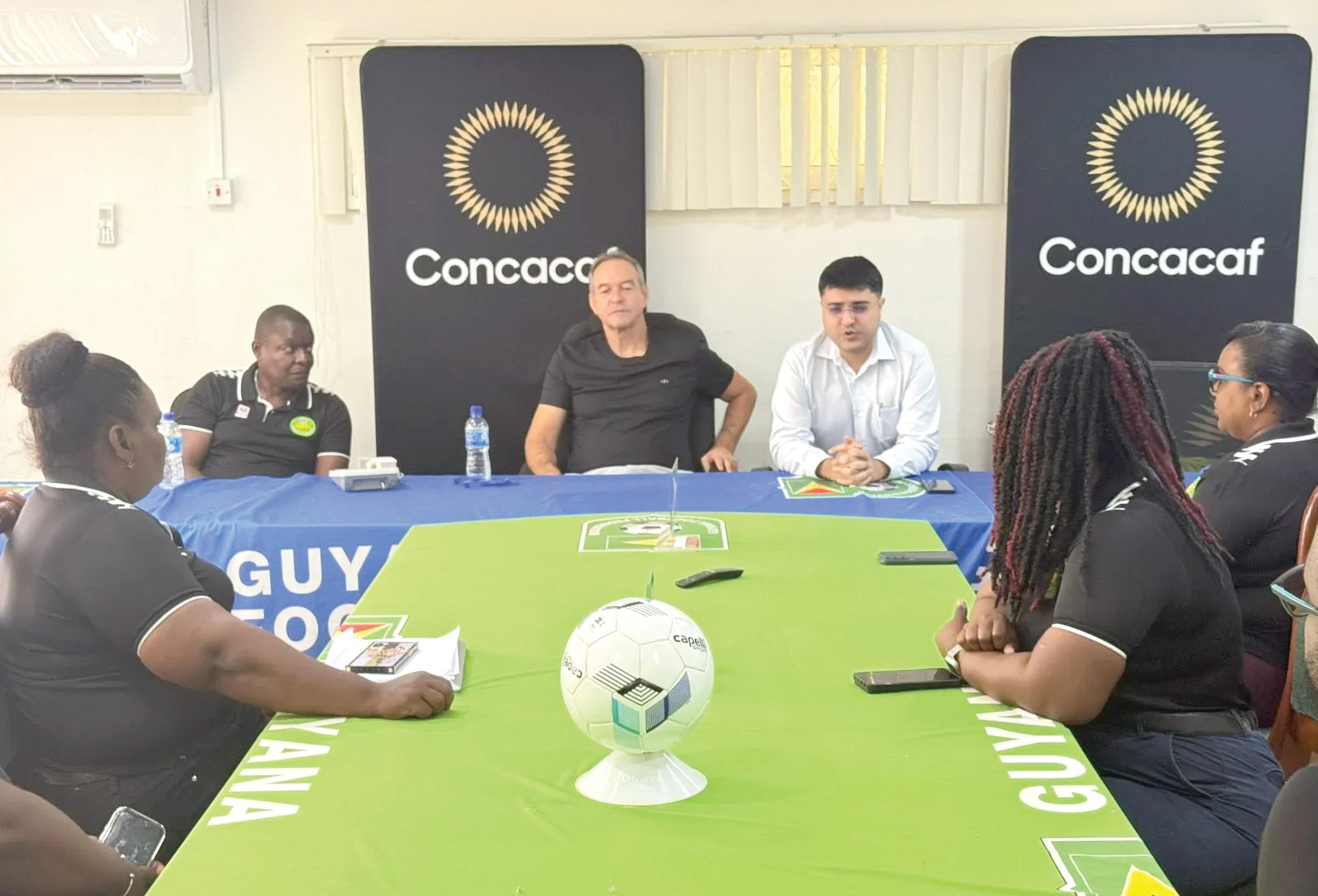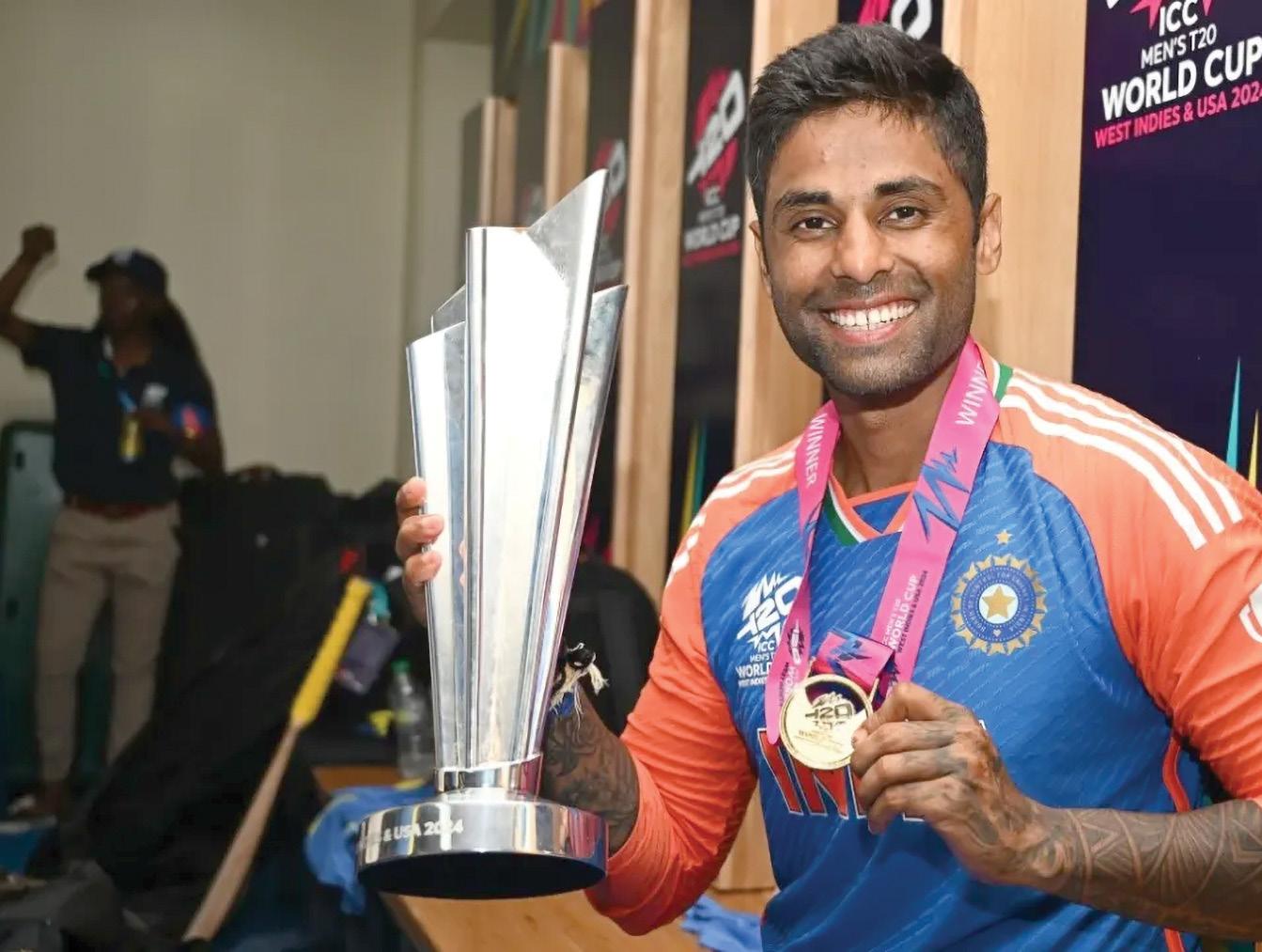

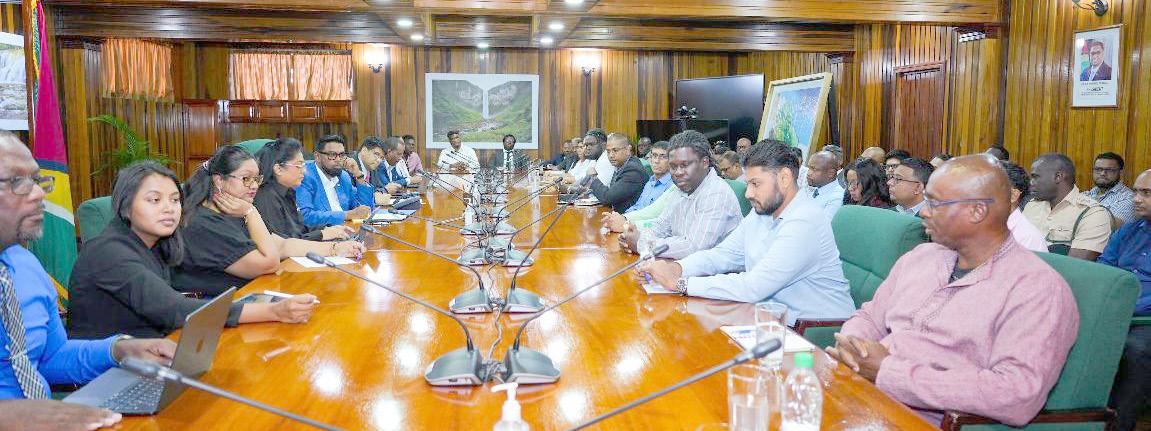
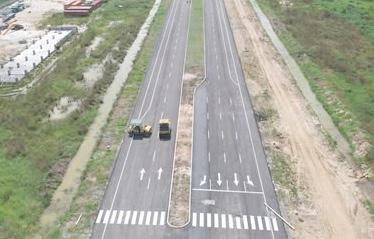
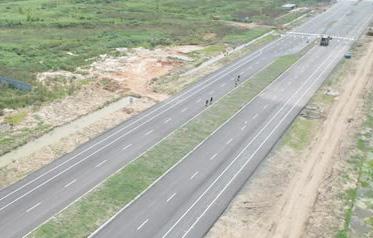

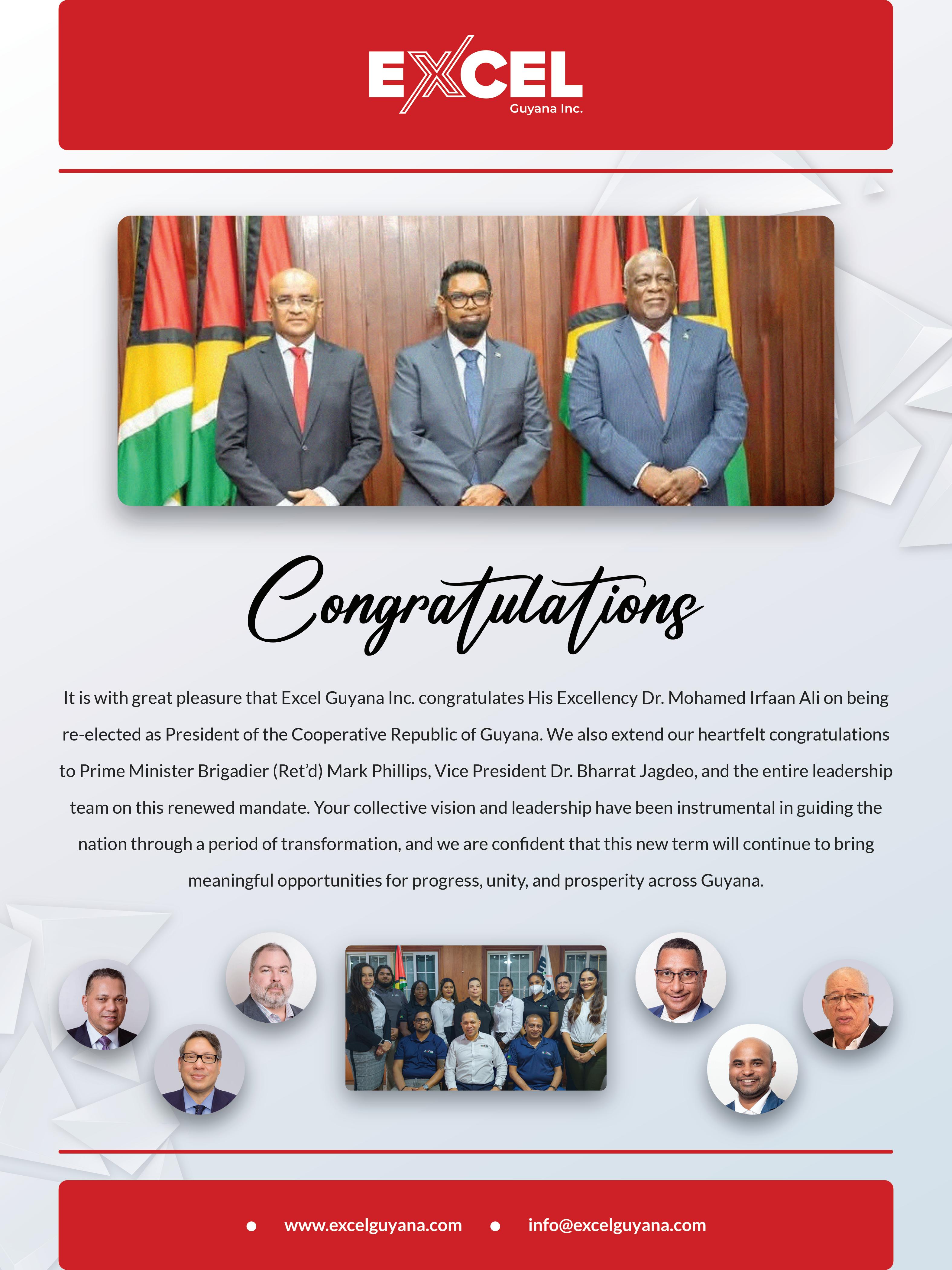








THE government’s commitment to accelerating Guyana’s digital transformation remains intact, according to President, Dr Irfaan Ali, during a meeting with information technology (IT) systems heads across all government agencies, at the Office of the President (OP), on Tuesday.
According to information on Dr. Ali’s official Facebook page, the objective of the meeting was to outline his administration’s commitment to digitisation, artificial intelligence (AI), and the integration of technology across public-sector operations.
The government’s Chief Technology Officer, Darryl Akeung, and
Guyana’s broader “Digital Guyana” initiative, which includes an ambitious agenda that is being rolled out under President Ali’s leadership.
Guyana is heading into a new era with several digital and artificial intelligence-led platforms aimed at improving access to government services and enhancing security.
These platforms, the ‘Citizen Portal’ and ‘AskGov,’ previously highlighted by President Ali, will ease every single bureaucracy, creating a stable, strong, service-driven and oriented system.
These investments will see Guyana being competitive in building a strong and resil -
region and a better place to live, work and raise a family.
The Citizen Portal will bring together all government services in one simple digital window. With just a few clicks, citizens will be able to apply for passports, birth certificates, driver’s licences and ID cards, access health and education records, file taxes and businesses can have the registration done online.
Additionally, citizens will be able to access utility bills, apply for housing and construction permits and much more.
The portal will also incorporate the electronic identification (eID) system, already implemented as
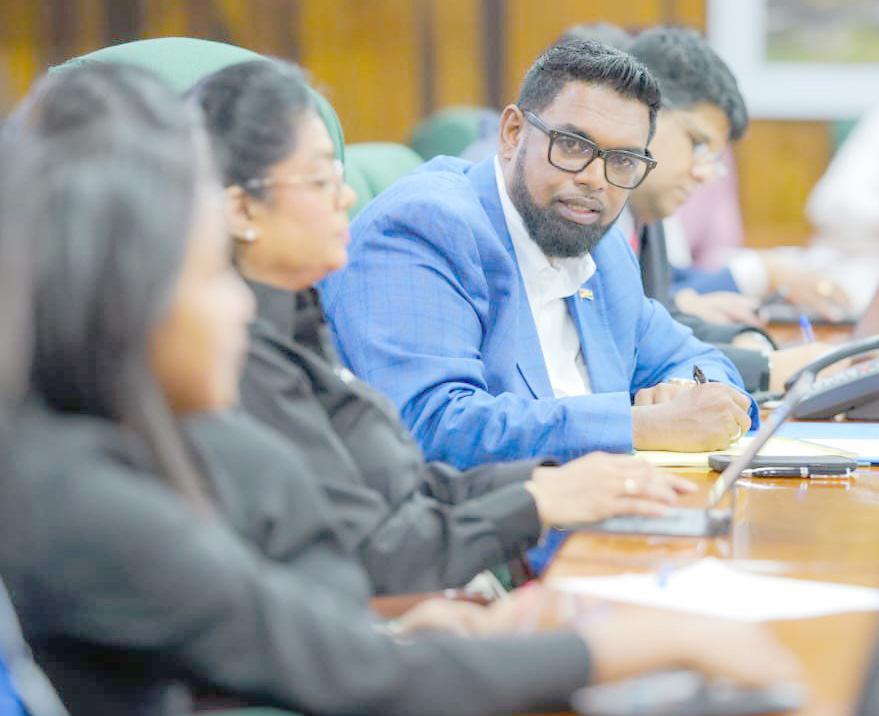
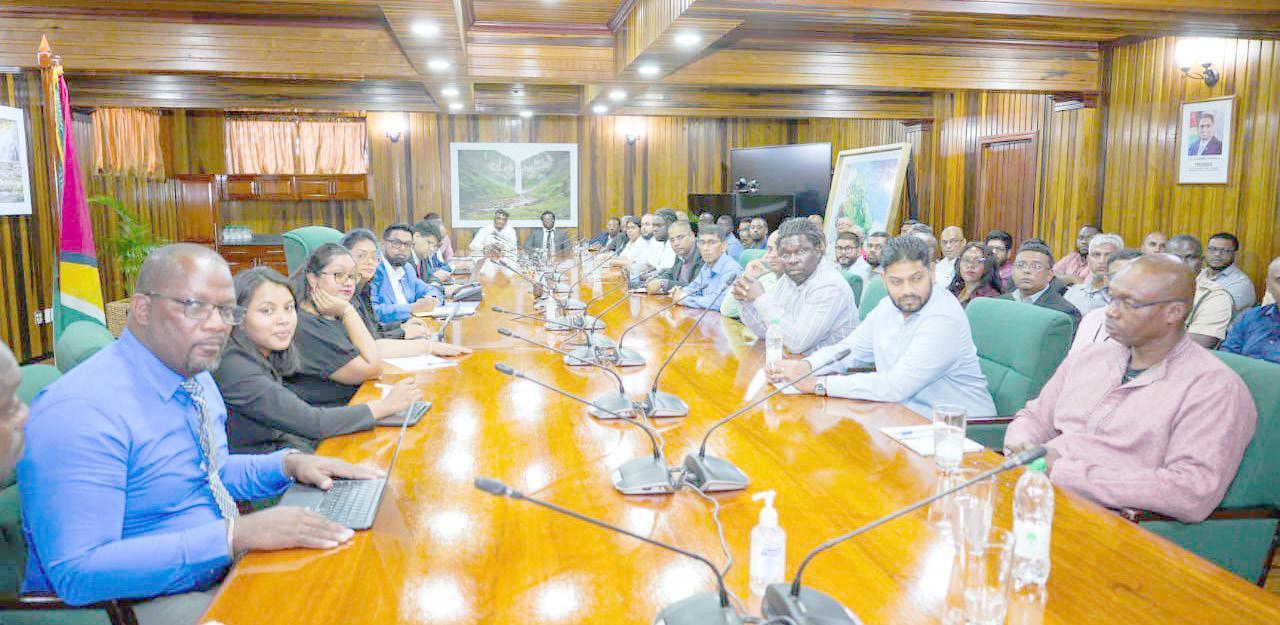
the Director of Presidential Affairs, Marcia Nadir-Sharma, were also in attendance.
This meeting cemented the new People’s Progressive Party/ Civic (PPP/C) administration’s commitment to continue right where it had left off prior to the recent elections.
It formed part of
ient economy, further strengthening the country’s transparency, efficiency, competitiveness and reliability in services.
Powered by innovation and anchored by the national e-identification system, President Ali said this transformation will make Guyana a digital leader in the
a source of truth for citizens’ identity, enabling every Guyanese to have verified access to these services anytime, from anywhere in Guyana.
Meanwhile, recognising the need for citizens to have reli -
able access to accurate information as it relates to government services, the Ask Government/AskGov will be Guyana’s official AI assistant for government services.
With 24 hours availability, the platform will be designed to answer citizens’ questions and help complete tasks such as renewing a licence,
checking the status of several types of applications or requesting documents.
“Powered by generative AI, AskGov can answer all government queries and solve problems without human intervention,” President Ali had said.
The government will also pursue the establishment of its first sovereign AI cloud.
This will see Guyana utilising cutting-edge tools such as big data to identify trends and support informed decisions in health, education and security; generative AI to create reports, curriculum guides and assist with chat support.
He had noted too that Digital Guyana will also introduce an integrated geographic information system to map and monitor national infrastructure in real time. This system will be able to create 3D models of all physical infrastructure across the country, such as roads, bridges,
kokers and drainage, underground conduits, utility posts, hydrants and more.
There will also be AI-driven surveillance for crime detection and response; smart traffic systems for congestion management and road safety; environmental sensors to monitor noise, air quality and illegal dumping; data sharing between law enforcement and agencies for coordinated response, these upgrades will help create cleaner, safer and more livable communities.
“Digital Guyana is our road map to a better future within reach, and within five years, under the PPP/C, Guyana will become a regional leader in digital transformation and a digital nation for everyone.
This is key and critical for our development. This is key and critical for our competitiveness,” President Ali said.
THE Heads of State of Cuba and Montserrat, in separate statements, have congratulated President, Dr. Irfaan Ali on his re-election to office, committing to continuing good relations.
In a post via X (formerly Twitter), Miguel Diaz-Canel Bermudez, President of the Republic of Cuba, extended congratulations to Dr Ali on his re-election.
He added, “I wish you success in your new term, while reaffirming my willingness to continue strengthening the relations of friendship and cooperation between our countries.”
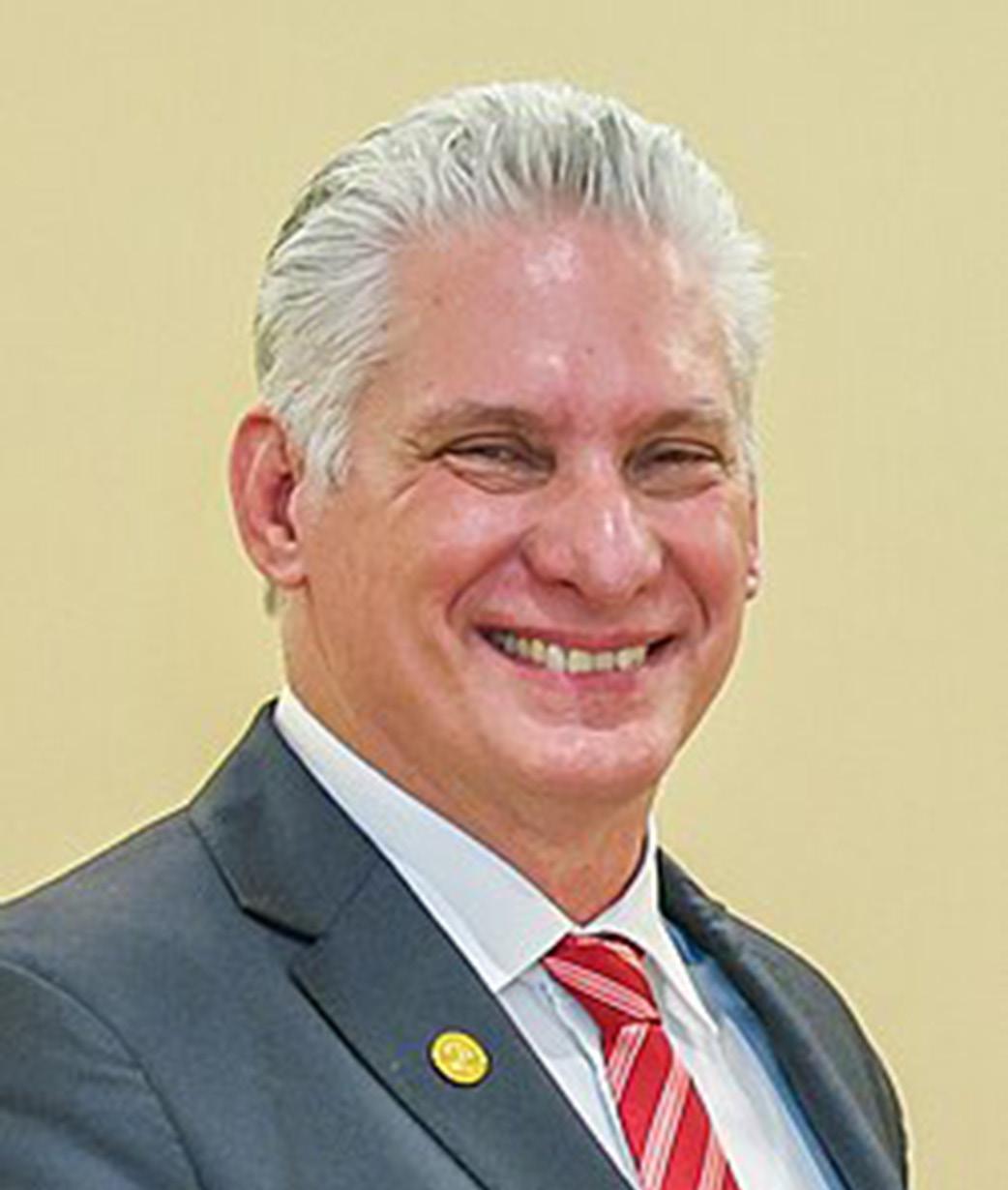
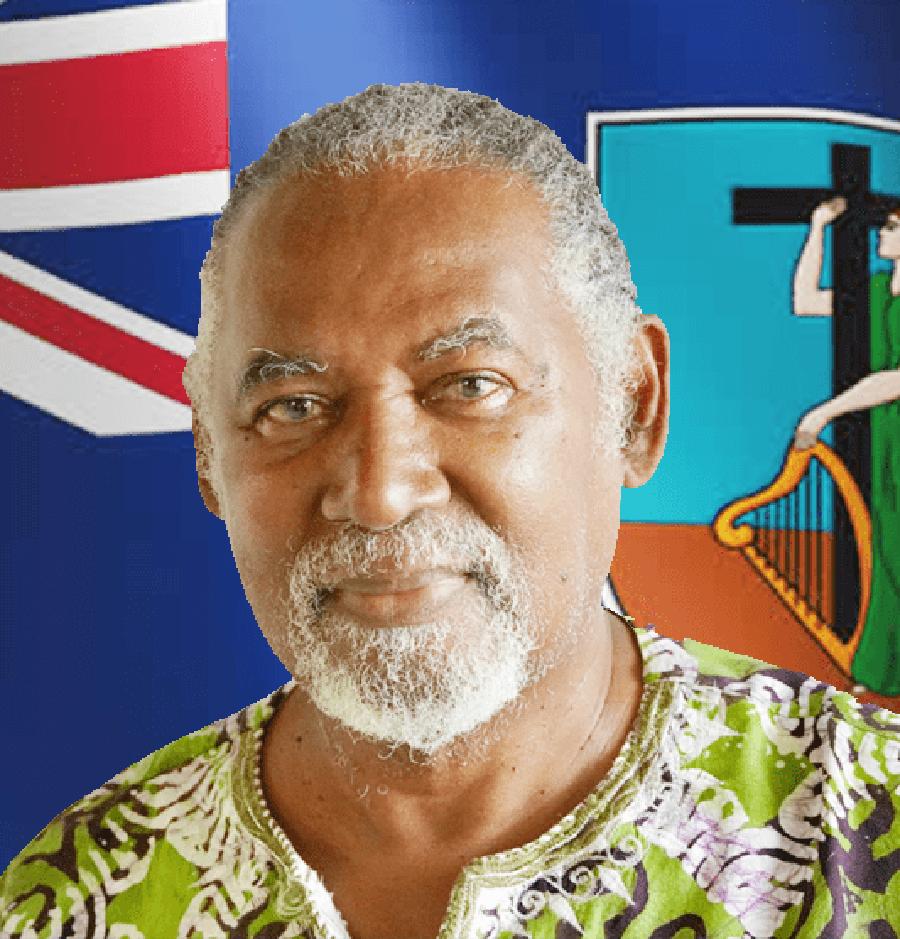
Meanwhile, the Premier and Minister of Finance and Economic Management of Montserrat, Reuben Meade,


in a letter dispatched to President Ali, conveyed congratulations on behalf of his government and country.
“Having keenly observed the recent general election, it was pleasing to hear your recommitment and some of your pledges to the people of your beloved nation of unity, inclusion and nation -
al transformation,” the correspondence said.
The Premier added that while challenges between the two countries differ, there are common bonds that unite them.
Premier Meade added that integration and collaboration across the community is important to keep all moving in a positive direction in the region.
Further, he said, “It is in that spirit that I look forward to collaborating with you at CARICOM meetings and other such forums, as we seek solutions to collectively improve the lives of our people across the community.”
President Ali was re-elected to serve as the President of Guyana for a second term following the country’s General and Regional Election on September 1. He was sworn in to office on September 7.

AS armed police took up posts in high-risk schools, Prime Minister Kamla Persad-Bissessar vowed to tackle school violence, saying enough was enough and calling the initiative the beginning of the end for bullying and classroom violence.
Her comments came hours after the Police Commissioner Allister Guevarro toured several high-risk schools and warned parents to keep their children in check or else they will be imprisoned.
In a statement hours after school was dismissed on Monday, Persad-Bissessar lamented the fear students and teachers felt because of violence.
“Our teachers have become victims of assault and abuse by some students and parents. That will not continue. Any student or parent who abuses or assaults a member of the teaching staff will be removed from school by the TTPS,” she said.
She also highlighted the impact on students.
“Too many students are bullied, robbed and beaten at schools. To some children, it is a terror to attend school. We have children failing because they are too afraid to attend school, as they are bullied every day. It’s a daily torture for them,” she said.
Addressing the issue of armed officers in the high-risk schools to address security concerns, she stated: “No matter what some commentators say, the law remains the law and TTPS officers are

free to carry their firearms inside or outside of schools if it is deemed necessary. Police officers report to their TTPS seniors and not the school principals. Therefore, acts of violence will be reported according to TTPS protocol and dealt with according to the law.”
She added, “Parents must understand that they have to raise their children responsibly and correct their conduct. TTPS officers are there to protect the innocent and will do so with the full support of my government.”
The Prime Minister also underscored her administration’s broader policy.
“Schools are sacred spaces for learning, not battlegrounds for fighting and bullying. During the election campaign, I pledged that my government would confront the scourge of school violence head-on. For too long, we have witnessed the decay of our society — our beloved nation awash in blood, plagued by record murder rates, and our schools tainted by violence, drugs, and fear,”

will confine them,” Guevarro warned.
Saying officers in schools were specially trained and ready to respond to immediate threats, he said: “Well-behaved children have nothing to fear. It’s those errant ones who want to bring disruption to the system that will have to worry.”
Persad-Bissessar said.
“That is why my government acted decisively. We made it clear that anyone who engages in violence, threats, intimidation, drug dealing, extortion, or bullying will face the full force of the law. I promised that we would purge our schools of this destructive behaviour by every legal means available. The people of this country have had enough — enough of school brawls, enough of wickedness in our classrooms, enough of fear in our communities. Law and order is being restored.”
She commended the CoP, saying the move to have police in schools was part of a holistic, integrated approach to tackling violence across the nation.
Following tours to the La Romaine Secondary, Ste Madeleine Secondary, Marabella North and Marabella South Secondary, San Fernando East Secondary, Gasparillo Secondary yesterday, CoP Guevarro also made it clear that parents must work with their children to curb delinquency.
“If parents cannot control their children, the TTPS
He said two officers have been assigned to each of the 50 designated high-risk schools. Guevarro explained that they will be stationed on compounds for the full school day, but will keep interactions with students minimal.
“They are not here to take over or be part of the education system. They are part of law enforcement,” he said
The CoP said the initiative will be reviewed after six months.
“We’ll be taking feedback so we can redirect how this initiative goes,” he noted.
“We can’t be in all places at all times, so we are deploying resources in the smartest, most effective way possible.”
Concerns have been raised about armed officers on school grounds, but Guevarro defended the decision.
“Put yourself in the place of a parent getting that call that your child is in the hospital with broken bones and lacerations,” he said.
“This has happened before. If officers have to respond to threats, they must be able to protect themselves, staff, and students. That is why some officers will be armed.”
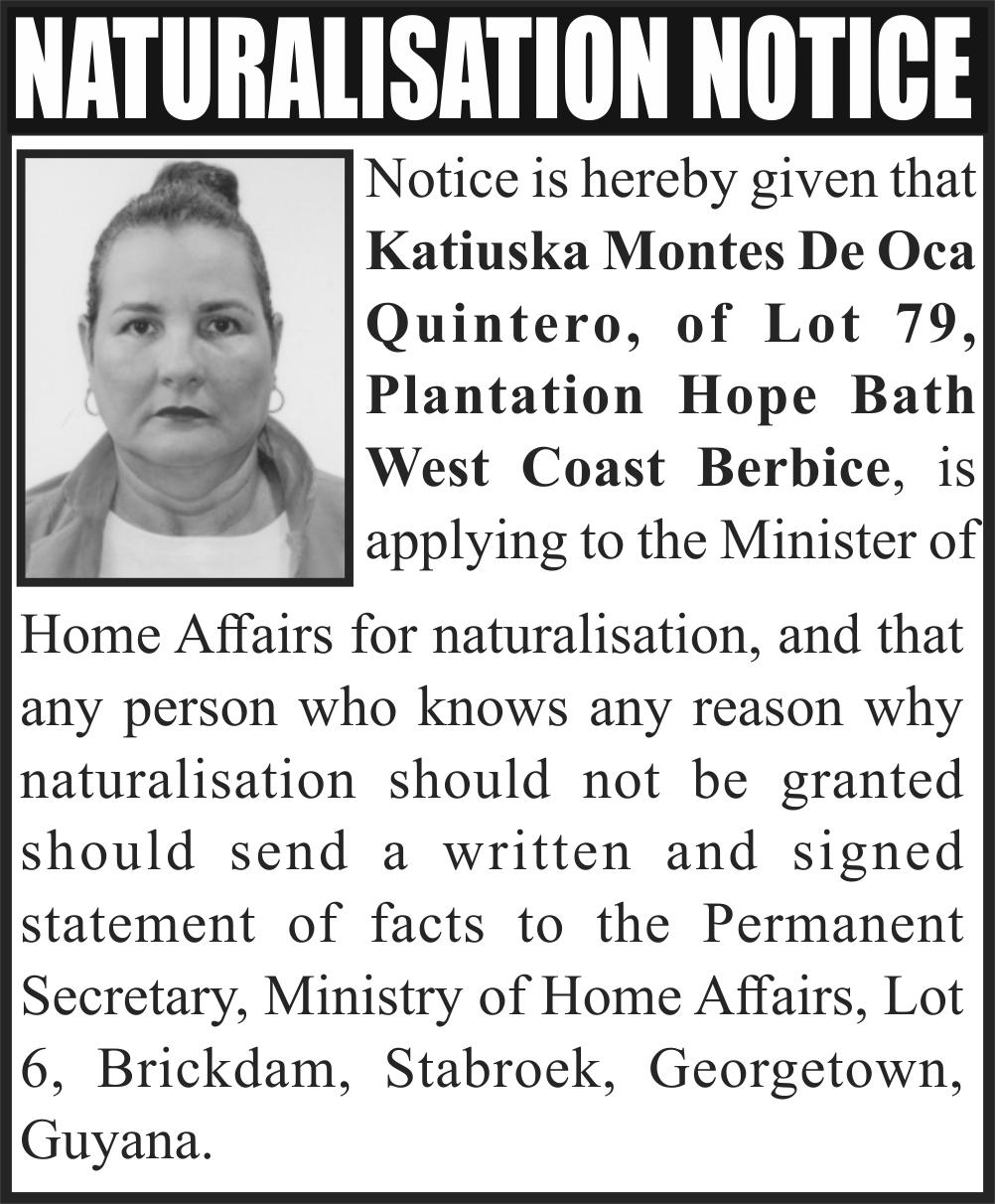
At Ste Madeleine Secondary, acting principal and staff showed Guevarro hotspot areas where students often gathered to smoke. Interim PTA president Jamie Peters said the presence of officers could make a difference.
“We all know the violence that is prevalent in schools,” Peters said.
“The best people to deal with it are the police. If they show a level of love and understanding while being firm, we can strike a balance that reduces the violence.”
Peters added that gangs remain a problem but welcomed recent infrastructure repairs at the school, done with the intervention of Education Minister Dr Michael Dowlath and local representatives.
Meanwhile, a school safety officer who requested anonymity described just how severe the problem had become.
“The fights were so bad they blocked traffic on the main road. Students came armed, and in one sweep, 13 penknives were seized,” the safety officer revealed.
“She was scared to go to school today (yesterday) and she is trying to forget that incident, so I don’t want to retraumatise her by speaking of the incident,” the parent said.
She noted that armed officers were necessary because of the threats that exist both inside and outside of the schools.
The Trinidad and Tobago Unified Teachers’ Association (TTUTA) and the National Parent-Teacher Association (NPTA) have both expressed reservations about officers carrying firearms in schools.
However, in an earlier interview, Dr Dowlath clarified that officers will remain outside classrooms unless needed in emergencies and that most will be equipped with non-lethal tools. Armed deployments, he stressed, will depend strictly on risk assessments.
A parent, whose daughter was brutally beaten outside a school in Couva earlier this year, praised the initiative to have police in schools. She said her daughter was physically healed but the trauma was still evident.
(Trinidad Guardian)

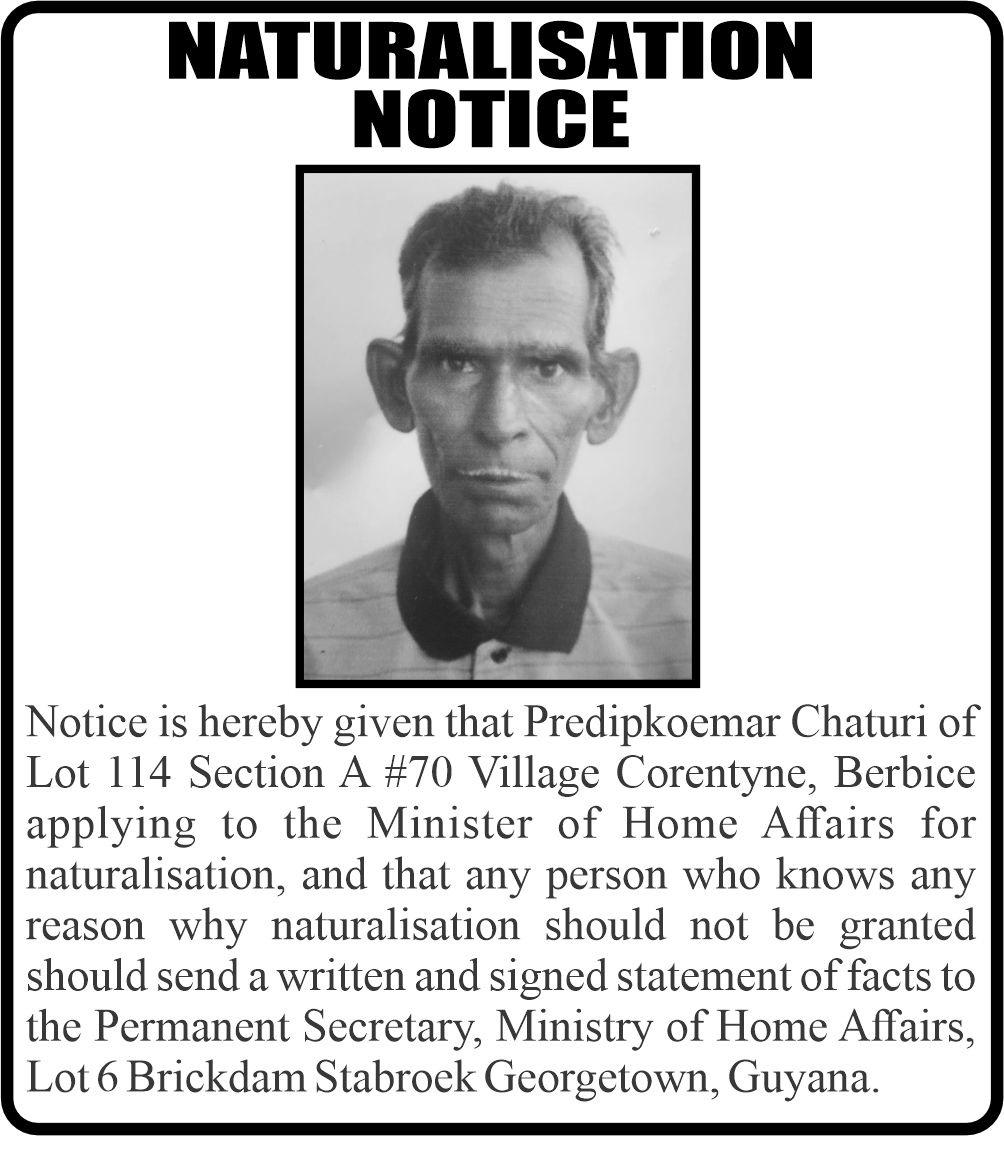

THE recently concluded general and regional elections on September 1, 2025, clearly show the growth of the country’s democratic institutions and the professionalism of the Guyana Elections Commission (GECOM).
As veteran political commentator, Freddie Kissoon pointed out in his recent column, the fact that opposition claims of electoral irregularities are unfounded, highlights the transparency and credibility of this electoral process.
GECOM deserves high praise for managing the most transparent elections in Guyana’s history. For the first time, Statements of Poll were uploaded to GECOM’s website in real time. This gave citizens direct access to results before political parties could gather their own data.
Thanks to this digital transparency, independent analysts could have made conclusive projections as early as 11:00 PM on election night. This achievement reflects GECOM’s commitment to openness.
The commission’s careful attention to detail was visible throughout the
entire process. All 438,467 votes were cast and counted with party agents present at the polling stations.
International observers from the Carter Center; the European Union; the Commonwealth; the Organization of American States and CARICOM, carried out extensive missions. The Carter Center alone sent 40 observers across all 10 regions.
Their unanimous conclusion was clear: the elections were run with integrity and professionalism. The election results themselves contradict any claims of irregularities. The People’s Progressive Party/Civic won decisively with 242,498 votes, which is 55.3%.
In contrast, the new We Invest in Nationhood party received 109,066 votes, significantly overtaking the traditional APNU opposition. As Kissoon wisely noted, if the elections were indeed flawed, a three-month-old party would not have found favour in these elections.
The rise of WIN as the main opposition, especially in traditional APNU strongholds in Regions Seven and 10, shows that the electorate’s voice is tru-
ly being heard.
GECOM’s ability to handle logistical challenges also highlights its competence. Despite tight timelines, the commission managed to recruit and train 11,718 poll workers. They set up multiple regional areas for distributing materials and enforced strict ballot secrecy, such as banning cell- phones in polling stations to prevent vote-buying.
The European Union’s mission acknowledged that while there were some delays, they did not affect the electoral process and the training sessions were regarded as thorough and professional.
The international community’s assessment strongly supports GECOM’s performance. The Commonwealth Observer Group praised the peaceful atmosphere and noted that election-related procedures were mostly respected.
The Carter Center commended polling day staff for doing their jobs with integrity and professionalism, stating that all Guyanese should be proud of how election day went. These commendations from experienced international observers hold significant meaning and highlight GECOM’s effective manage-
ment of a complex electoral process.
The opposition’s claims of irregularities, especially about the voters list, lack solid evidence. While 757,690 citizens were registered, only 438,467 cast ballots.
Although this is lower than the turnout in 2020, it aligns with standard democratic participation patterns rather than indicating systemic issues. As Kissoon rightly pointed out, “a bloated list has no relation to voting,” and the actual turnout shows that the list is accurate in practice.
The 2025 elections mark a pivotal moment for Guyanese democracy. GECOM has set new standards for transparency, professionalism, and credibility that will benefit the nation in future elections.
The commission deserves the gratitude of all Guyanese for successfully conducting what multiple international observers have confirmed as free, fair, and transparent elections. This major milestone strengthens Guyana’s democratic standing and lays a solid foundation for the country’s ongoing democratic progress.
Dear Editor,
I READ with utter disbelief a Facebook post made by the Guyana Press Association (GPA) relating to a now popular interaction between President Irfaan Ali and ‘journalist’ Travis Chase condemning what it labeled as the “President’s attack on Mr. Chase”.
It is saddening that the GPA, which claims to be the sole representative body of media workers in Guyana, does not seem to have a clue about how the media should address the Head of State of a country.
The deputy director of the Protocol
School of Washington, Robert Hickey, in his book Honor & Respect: The Official Guide to Names, Titles, & Forms of Address, highlights that in conversations a president should be referred to as: Mr. President.
The AP Style, which is used by most media as their default when addressing a president, states that the first and family name should be used on the first reference during interactions, so it would be President Irfaan Ali and the last name can be used for subsequent references.
Perhaps the GPA should spend a little less time on issuing statements with a political bias and seek to spend more
time on what should perhaps be one of its fundamental purposes — developing the overall quality of the press in Guyana.
Such development would include ensuring that its members understand the most basic of protocols when addressing the Head of State, perhaps providing training on such and other media etiquette and rules, and calling out its members when they have not observed the most basic of courtesies.
Instead, the GPA defended Travis Chase’s plainly rude and aggressive approach in addressing the President, which shows the organisation’s apparent bias, lack of basic understanding of pro-
tocol in addressing the President and, by extension, agreement with the disrespect shown by Chase to His Excellency.
The GPA’s stance on this issue and subsequent agreement with the manner in which Chase addressed the President of Guyana highlights its continued bias against the government, and undermines the legitimacy of the association as an independent representative body for media workers.
I READ an interview with the AFC’s chairman David Patterson on the 2025 election results and there were distinct indications that this gentleman is living in the past and refuses to see that since 2005 when the AFC was born history has moved on, Guyana has moved on and the AFC should move on and stop yearning for the glory of yesterday.
Nowhere in the interview did Patterson concede that the results were legitimate and accepted a PPP victory. He remarked that the statistics of the results are “hardly probable.” What has this man learnt from the past? Mr Patterson is not on record as acknowledging the PPP’s victory in the 2020 poll. He comes back in 2025 with the same requiem, unable to see that Guyana and the world did not believe the PPP rigged the 2020 contest and that it did so in the 2025 competition.
When you read those words of “hardly probable,” you feel people like these are not credible politicians and should not be part of Guyana’s political landscape.
Here is large evidence that Mr Patterson is a sad reflection of people who yearn for the past. I quote: “Based on our past performance, in and out of parliament, we felt the citizens would have trusted us to [sic] again to represent their interest, so of course we are disappointed.”
Which world is David Patterson living in? The consensus in the entire space where Guyanese live in or out of the land was that the AFC failed to even glance back at the dream it was born with when it got into power, and thus it began as early as 2015 the long goodbye. While it
was in power, it participated in the 2018 local government elections (LGEs) and the results showed complete defeat. It did not enter into the 2023 LGEs.
Patterson told his interviewer that the AFC would be back bigger and better after an introspective period. But was there an introspective period after electoral defeat in 2020? Was there a hard look at the AFC after it lost the 2018 LGEs?
If the answer is yes, then what did the AFC learn from those two periods of soul searching? And what was learnt didn’t help in 2025 obviously. A newcomer party got 16 seats and a very small party, Forward Guyana, got a seat, while the AFC did not go near 4,000 much less 6,000 that allows for parliamentary representation.
Patterson seems to have gone in the same direction of mental aridity as Aubrey Norton (see part 1). He told his interviewer that in relation to the results, it is the AFC’s assessment that the voters said no to dictatorship.
But that makes no sense and is mindless rambling. The PPP was in office for five years, was the incumbent and won the elections with a larger parliamentary majority. In other words, the voters wanted to see Irfaan Ali have five more years.
Who or what is Patterson referring to when he said: “The people have said no to racism and cronyism and exclusion?”
He could not have meant the incumbent because the incumbent remains the incumbent after the elections. He has to be referring to the PNC that showed no rejectionist attitude to racial sermons

inside APNU, which included David Hinds and Tacuma Ogunseye. Patterson could not be referring to the PPP because over the past five years in office, not one government minister spewed racial invectives.
Here is another mysterious part of Patterson’s interview. He intoned that the AFC will have to “adjust, reflect and rebuild.” Adjust to what? The answer is to the reality of a new Guyanese generation. But is the AFC capable of that?
It would have been more electorally successful in 2025 if it has adjusted to this new generation by denouncing rigged elections in 2020. Its leader Nigel Hughes had a chance to do so when he became leader, but when asked about rigged elections in 2020, said he knows nothing about that.
Here is Patterson once more: “We will seek to learn from this (2025 election results) and move forward to 2030.”
There will be no Alliance For Change in 2030. I leave David with a few lines from the theme of a Michael Caine movie from the 1970s named “X, Y and Zee,” sung by the 1970s pop group, “Three Dog Night.” I had liked that group, and still like the song and movie.
“Going in circles, don’t really know Where I have come from, where I will go
I’ve been through a million trips in the night
Living with shadows, looking for light And passing the faces, how lonely they seem
Looking for traces of yesterday’s dream.”
DISCLAIMER: The views and opinions expressed in this column are solely those of the author and do not necessarily reflect the official policy or position of the Guyana National Newspapers Limited.
THE Regional Health Services Department in Region Six (East Berbice-Corentyne) has addressed recent claims circulating on social media, suggesting that the reassignment of one of its drivers was politically motivated
The department, in a press statement, firmly denied these allegations, stating that the reassignment was a standard administrative decision aimed at ensuring continued healthcare delivery. The clarification comes in response to
a post made by leader of The Assembly for Liberty and Prosperity (ALP), Simona Broomes and Team Mohamed, who both described the recent transfer of vehicle driver, Stanley Jacob, as political persecution.
According to the department, the movement of drivers across various health institutions within Region Six is a regular operational procedure. Such transfers are done to address staffing gaps and maintain the efficient functioning of health services. Jacob’s transfer was no different, the department said.
On Monday, September 8, 2025, he was reassigned from the Regional Health Services Department to the Port Mourant Hospital to fill a critical staffing need.
The reassignment was prompted by the temporary absence of one of the hospital’s drivers, who is currently on leave. Jacob was the only available driver on duty and was deployed to ensure uninterrupted emergency patient transfers.
“This move was necessary to maintain emergency services and patient
care at the Port Mourant Hospital,” the department emphasised.
The Regional Health Services Department categorically rejected the notion that the transfer was politically influenced, asserting that it was part of routine operational planning.
“We urge the public not to misinterpret these routine administrative actions. They are strictly aimed at sustaining the delivery of effective and timely healthcare across Region Six,” the statement concluded.
PRIME Minister, Brigadier (Ret’d) Mark Phillips used his first public address following his swearing-in for a second term to spotlight the Government’s commitment to Indigenous empowerment and inclusive development.
Speaking at the 2025 Amerindian Heritage Cultural Extravaganza, hosted by the Ministry of Amerindian Affairs on Monday evening, he described the importance of heritage in Guyana’s development.
“Heritage is a living, breathing force that continues to shape our present and, most importantly, our shared future. It is a heritage of stewardship, teaching us to live in harmony with our environment. It is a heritage of community, reminding us that our greatest strength lies in unity and mutual respect.”
Prime Minister Phillips described the nation’s Indigenous peoples as custodians of Guyana’s forests and key partners in climate action. He announced that under the
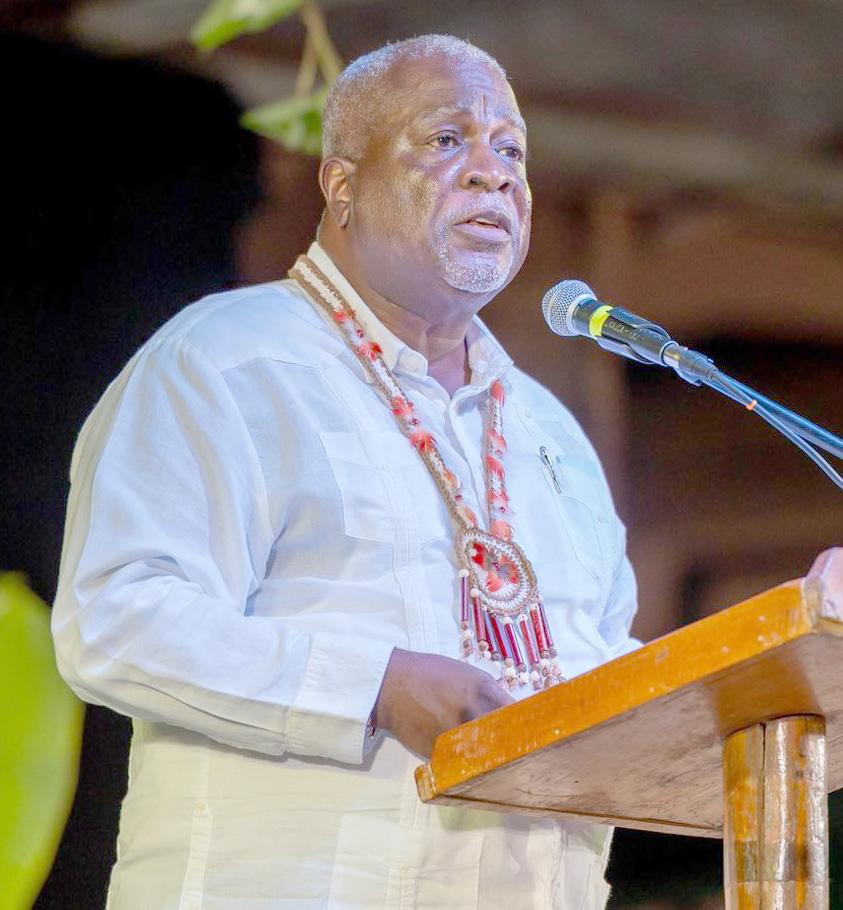
Low Carbon Development Strategy (LCDS), Indigenous communities will receive no less than 15 percent of all carbon credit revenues — a direct investment in their stewardship and contribution to global environmental protection.
He also addressed land
rights, calling them fundamental to the Government’s development agenda. The resolution of outstanding claims will be accelerated, he said, to ensure security of tenure and provide communities with the foundation to build sustainable futures.
The Prime Minister con-
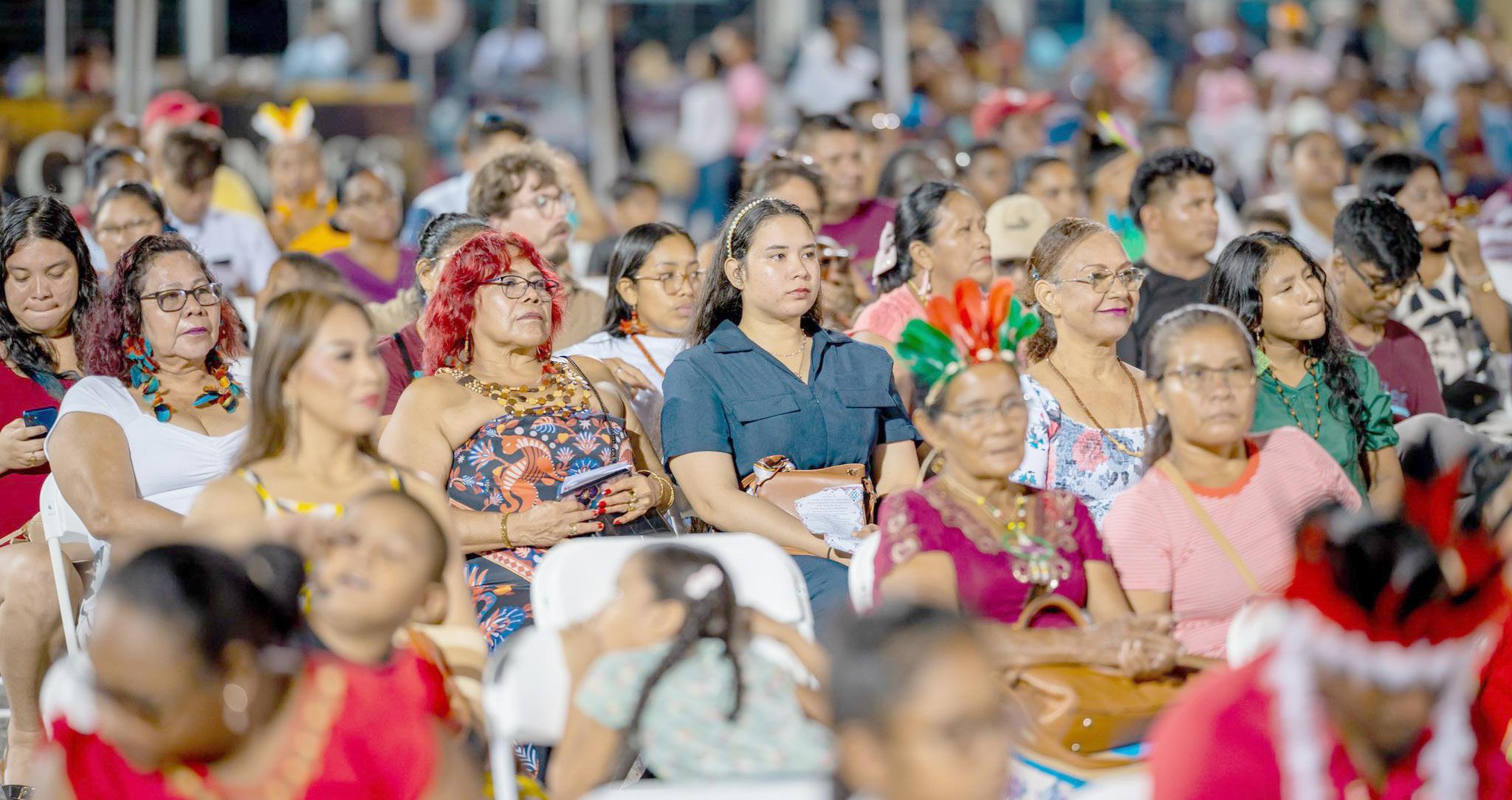
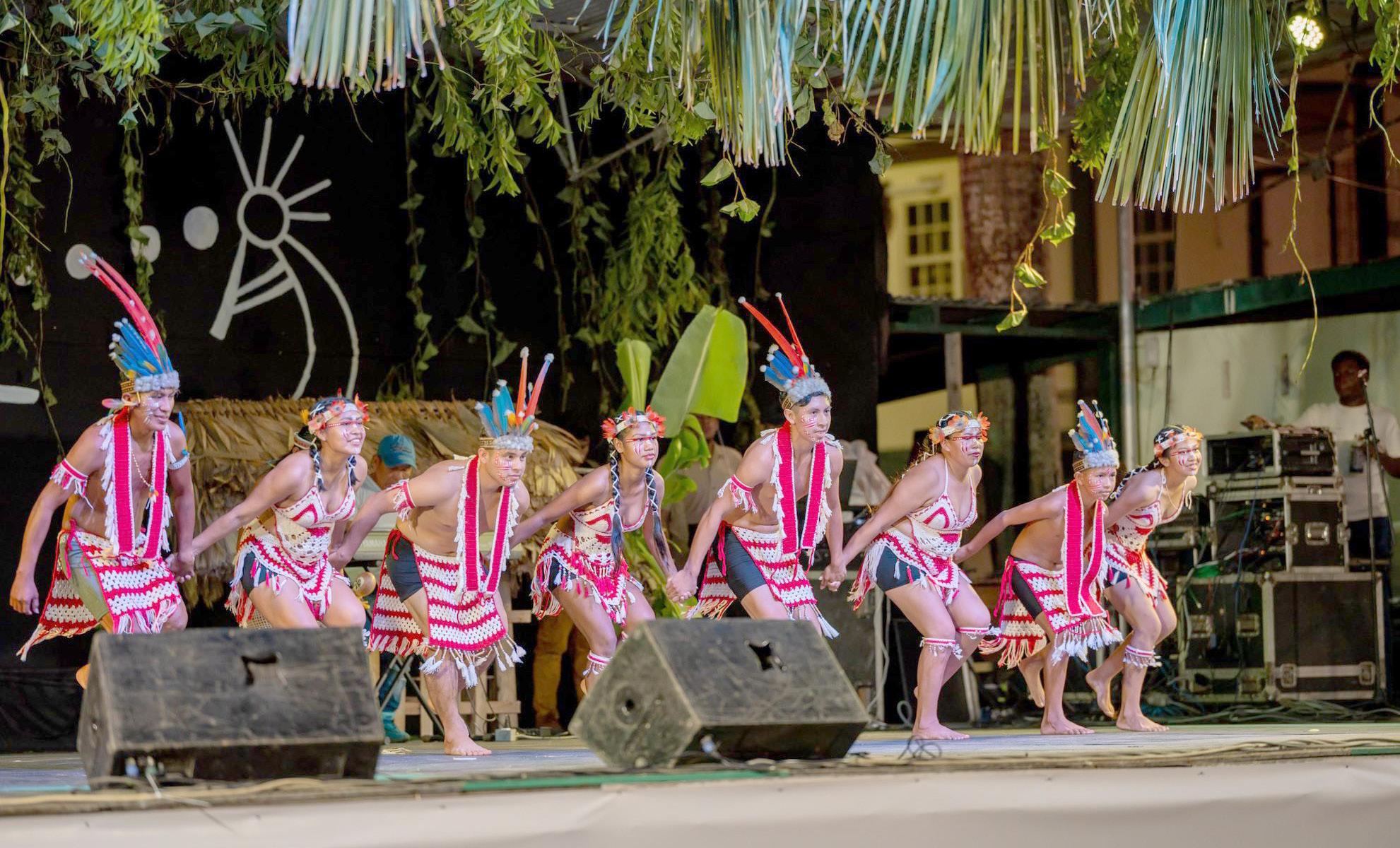
firmed that the Amerindian Act will undergo a comprehensive revision, developed in collaboration with Indigenous leaders.
The updated legislation will modernise governance frameworks, strengthen autonomy, and protect rights for generations to come.
On capacity-building, the Prime Minister outlined plans to expand the Community Support Officer (CSO) programme.
Officers will be retrained, upskilled, and provided with increased stipends.
Education remains a key priority, and Prime Minister Phillips explained that new schools and dormitories are being constructed to guarantee universal access to secondary education in the hinterland. “Every child, regardless of geography, must have the opportunity to pursue quality learning and compete in a modern economy.”
Healthcare delivery was also addressed. Phillips spoke of the continued rollout of telemedicine centres and the
equipping of health posts with essential tools and transport — measures designed to close the gap between coastal and interior communities.
Turning to economic development, the Prime Minister outlined support for community-led initiatives in agriculture, agro-processing, and sustainable tourism.
Training, market access, and enterprise support will help villages transition from subsistence to surplus.
“We will ensure communities have the tools and opportunities to process their own crops, add value, and create products that can be sold both locally and internationally.”
He also spoke of tourism as a driver of employment and economic resilience.
Communities will be supported in developing products that reflect their natural and cultural heritage, from traditional crafts and cuisine to wildlife tours and immersive cultural experiences.
“We will assist in the design and marketing of
multi-village tourism circuits, creating opportunities for communities to benefit directly from Guyana’s growing tourism sector.”
Throughout his remarks, Prime Minister Phillips emphasised that the Government’s development strategy is being shaped through direct engagement with village councils and Indigenous leaders. It is a collaborative process, built from the ground up.
He also reflected on the significance of Amerindian Heritage Month — not only as a celebration of culture, but as a moment to strengthen national partnership.
“Preserving your cultural heritage remains integral to your development, and it is the foundation upon which your communities are built.
Our government is committed to working with you to preserve and promote your heritage while ensuring that no community is left behind in Guyana’s progress.”

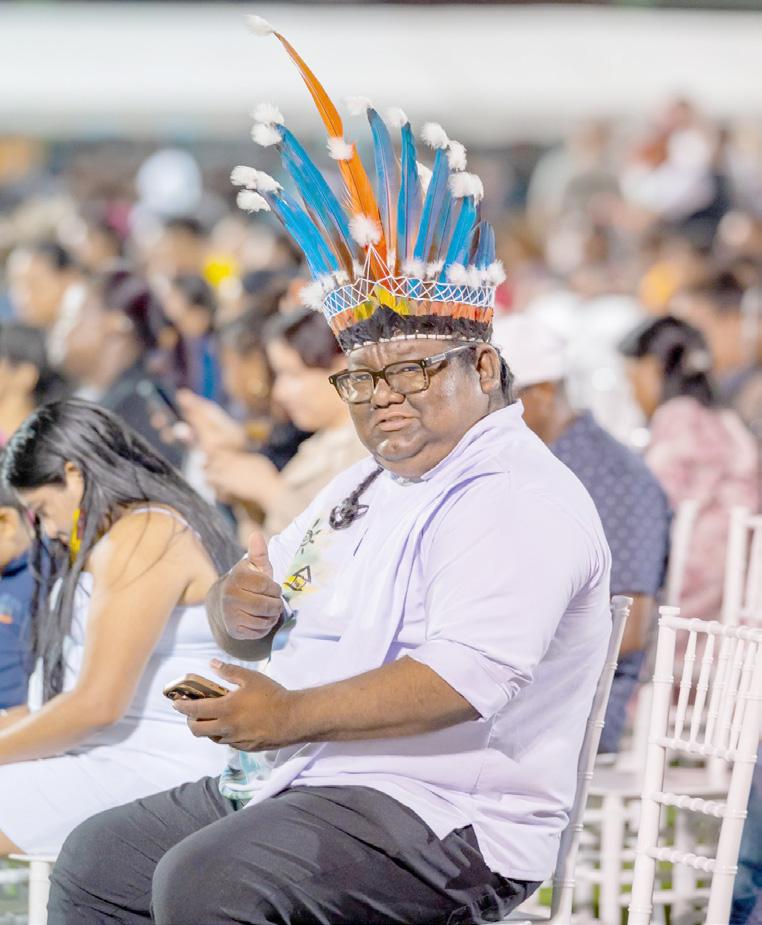

PRESIDENT Dr Irfaan Ali started his second term over the weekend, after the Guyana Elections Commission (GECOM) confirmed what everyone already knew - the People’s Progressive Party/Civic (PPP/C) and their presidential candidate had won the September 1, 2025, General and Regional Elections.
The final GECOM declaration was delayed for two days by successive opposition parties’ complaints, including calls for recounts that only confirmed they’d lost, leaving the losers sounding and looking like sour grapes, and simply opposing for opposing sake.
GECOM responded to complaints, but A Partnership for National Unity (APNU), the biggest loser, refused to accept its loss, its leadership scraping for words to explain unilaterally erasing the results of the national democratic exercise and declaring the entire process unfree and unfair.
The fierce ongoing online warfare between opposing political propagandists also continued, influencers and permanent critics at home and abroad mostly debating why the APNU and the People’s National Congress Reform (PNCR) lost so-badly, and who is to be blamed.
The long knives are already out, with loud calls from within for PNCR Leader Aubrey Norton to resign.
But even though he has reluctantly raised a small white flag, the PNCR Leader continues to live in denial, absolutely insisting that something had to be wrong with GECOM’s results.
Now, APNU is talking about appealing GECOM’s declaration in the High Court after its two elections commissioners, and a third representing the Working People’s Alliance (WPA), refused to endorse the results, abstaining from voting with reasons even they found difficult to explain to the press.
The three opposition commissioners refused to vote, forcing the Commission’s Chair to cast her vote alongside the PPP/C’s three commissioners. They then accused her of favouring the ruling party.
Understandably, the PNCR won’t take kindly to the fact that their traditional bases of pillar-to-post support in their two citadel electoral regions (Regions 4 and 10) were reduced to rubble by a three-month-old bulldozing newcomer outfit led by an internet-savvy ‘Rich Kid’ with an actual golden touch.
The PNCR had hoped that Azruddin Mohamed and his hastily stitched We Invest in Nation (WIN) party would have infiltrated the PPP/C’s support base, but that turned out to be a deadly miscalculation, as WIN actually bit
deeply into the heart of the PNCR’s national support.
As per tradition everywhere else, at elections time, ‘All politics is local!’
As such, there was no indication on Elections Day and after that any voter in Guyana cared or feared that U.S. troops were in waters off the coast of Guyana’s neighbour Venezuela.
The Guyana Defence Force (GDF) reported on September 1 that a boat transporting ballot boxes on a river in a shared border came under gunfire ‘from the Venezuela side’.
The GDF said the soldiers accompanying the GECOM boxes returned fire, but no one was hurt.
However, while the GDF statement did not mention, blame or accuse Venezuela, its Defence Minister responded like it had.
The three menacing U.S. warships and a nuclear submarine with 4,500 sailors and 2,200 marines deployed to the Venezuelan coast, had the neighbouring nation on very-high alert, while Guyanese went to polling stations to cast their ballots that day.
President Ali told the local media that Guyana will always be willing to support counter-narcotics measures in Latin America and the Caribbean but also insisted “the region must be respected as a Zone of Peace”.
But none of that seemed to matter to most Guyanese, who’ve lived with Venezuela’s claim all their lives, the majority born and sworn to the national pledge to give-up ‘Not a Blade of Grass!’ as clearly stated in the anthemlike song by The Tradewinds
Instead, they seemed more interested in how the parties they voted for were preparing for the next five years, with President Ali and the PPP/C at the helm of the ship of state.
As Commander-in-Chief of his nation’s armed forces, President Ali insists Guyana does not want to go to war and will do all it can to avoid one but at the same time will not allow itself to be attacked unprepared or unable to respond.
Guyana is not alone in this fight.
President Trump’s pursuit of Venezuela’s oil sees Caracas coming under intense pressure, even while Chevron – already there for over-a-century – is now also the second-biggest player in Essequibo’s Stabroek Block, having purchased Hess Corporation’s Guyana assets.
Chevron overcame Exxon Mobil’s sustained legal efforts to block its takeover of Hess in Guyana and it’s still uncertain whether the two U.S. oil giants will dance or fight over shared access to Essequibo’s subterranean energy resources.

China has warned the U.S. that Beijing’s interests will also be at stake if the Washington decides to take any military action against Venezuela in pursuit of regime change.
Undoubtedly the most popular person in Guyana today, President Ali’s administration managed the economic mess they inherited from the APNU in 2020 in an admirable manner in its first term, turning one of the region’s poorest nations into the world’s fastest-growing oil-based economy.
The PPP/C’s major second-term priorities are already spelt-out in its ‘Agenda 30’ manifesto, but it will also have to creatively manage Guyana’s way around the new politics that the 2025 elections results have yielded.
But none of that seemed to matter since the September 1 presidential ballot has not only given President Ali and the
PPP/C a second term, but also a bigger parliamentary margin.
Never mind the understandable sucking of bunches of sour grapes by the sorest losers, Guyana’s parties and alliances campaigned, voters voted, and results were shared in real time.
Guyana has spoken and GECOM has confirmed that they have resolutely approved President Ali’s leadership for another five years, depositing their confidence in his proven ability to show that Guyana’s voters won’t waste their wonders.
Now for a second term of popular PPP/C governance…
DISCLAIMER: The views and opinions expressed in this column are solely those of the author and do not necessarily reflect the official policy or position of the Guyana National Newspapers Limited.

TWO Brazilian Supreme Court justices on Tuesday voted to convict former President Jair Bolsonaro of leading a criminal conspiracy to overturn the 2022 election, as they cast the first votes in the final phase of the ex-president's trial.
The five-judge panel is now one vote away from a majority convicting Bolsonaro of orchestrating an attempted coup to remain in power after his 2022 electoral defeat to leftist President Luiz Inacio Lula da Silva.
The charges stem from a federal police investigation that un -
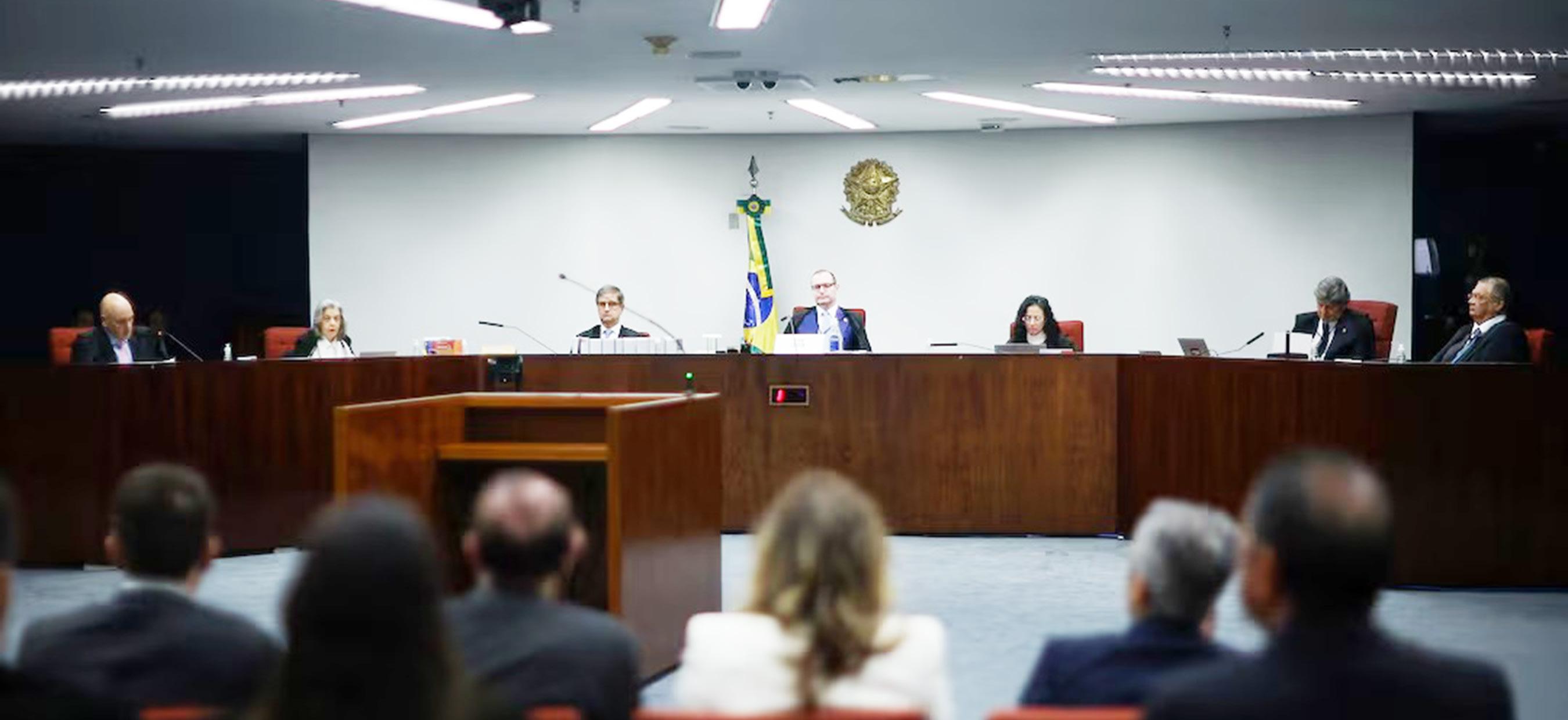

covered the alleged plot, including plans to poison Lula and his running mate.
Bolsonaro stands accused of taking part in an armed criminal organisation, attempting to violently abolish democracy, organising a coup, and damaging government property and protected cultural assets.
His lawyers have maintained his innocence on all counts.
The charges are tied to Bolsonaro's alleged incitement of riots in January 2023, when

thousands of his supporters stormed and ransacked the Congress, Presidential Palace, and Supreme Court in Brasilia, the capital.
The first member of the high court to cast his vote on the case was Justice Alexandre de Moraes, an alleged assassination target in the coup plot, who oversaw the 2022 elections and now presides over the coup-related trials.
He voted to convict Bolsonaro of all the crimes for which he had been charged, calling the former president the "leader of the criminal organisation."
The role of Moraes in the case has made him a target of Bolsonaro's allies, including U.S. President Donald Trump and his administration, which imposed sanctions on the judge and levied 50 per cent tariffs on many Brazilian imports to the U.S. for what Trump called a "witch hunt" against the former Brazilian president.
Justice Flavio Dino, Lula's former justice
minister, also voted on Tuesday to convict Bolsonaro on all counts.
Next up on Wednesday morning is Justice Luiz Fux, followed by Justice Carmen Luciaa Lula appointee - and Justice Cristiano Zanin, who presides over the panel and is a former attorney for Lula. Two Supreme Court justices appointed by Bolsonaro are not on the panel. If convicted, Bolsonaro faces a maximum potential sentence of 40 years.
Even if convicted, Bolsonaro could avoid his full sentence. Already barred from running for office until 2030, his supporters hope a future president might grant him a pardon.
Sao Paulo Governor Tarcisio de Freitas, who served in Bolsonaro's cabinet, pushed Congress last week to grant the ex-president amnesty, a move many saw as positioning the governor as an heir to Bolsonaro's coalition in next year's election. (Reuters)
AS the UN General Assembly opened its 80th session on Tuesday, new President Annalena Baerbock called on member states to unite in addressing global crises – from war and poverty to climate change – taking her oath on the original 1945 Charter and pledging to lead with courage and inclusiveness.
This will be “no ordinary session,” she pledged, with the multilateral system beset by overlapping crises and heightened disunity.
A former foreign minister of Germany, Ms Baerbock becomes only the fifth woman in history to preside over the General Assembly.
In a symbolic gesture linking past to present, she swore her oath on the UN’s founding Charter from the San Francisco Conference in 1945 – and accepted the assembly’s ornate gavel from her predecessor, Philémon Yang of Cameroon.
The Charter itself, preserved by the US National Archives, has returned to UN Headquarters for the first time in decades.
Now on display through September, the 1945 document is more than a historical artifact – it is a living reminder of the collective pledge to build peace, uphold human rights and pursue shared values and goals through multilateral co-operation.
The gavel carries its own storied weight. A gift from Iceland, it is larger and more ornate than the ones used in UN conference rooms. The symbol of order in the “parliament of the world,” it is used to open and close meetings, adopt resolutions, and, at times, bring the assembly to silence.
In her address, Ms Baerbock acknowledged the grim realities facing millions across the globe
– from children starv -
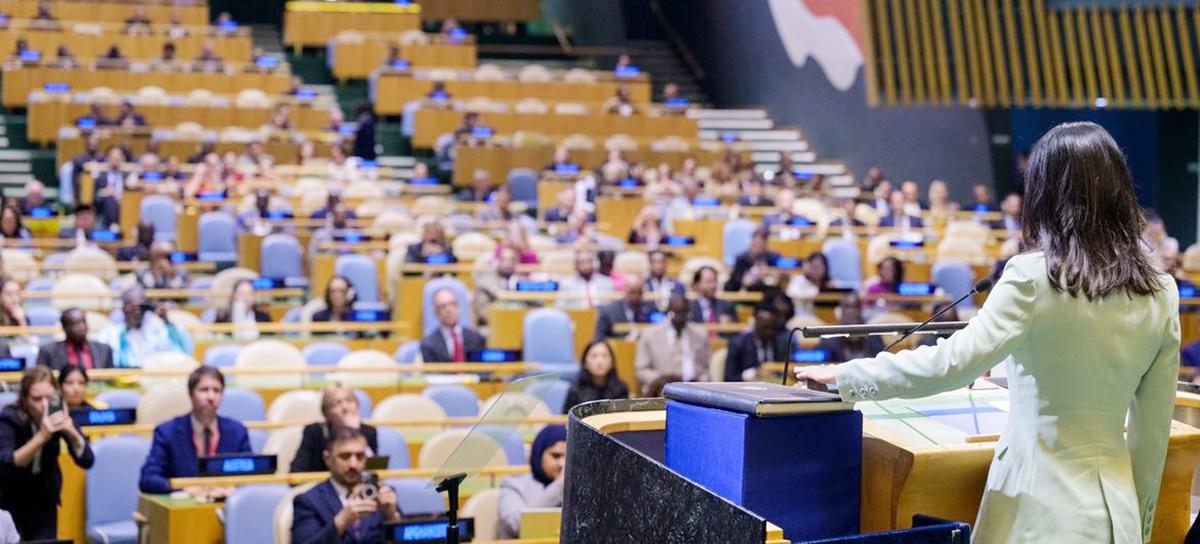
ing in Gaza and Afghan girls barred from school – to families in Ukraine hiding from missile attacks, and Pacific Islanders watching their homes swallowed up by the sea.
“Our world is in pain, indeed,” she told delegates in the General Assembly Hall.
“But imagine how much more pain there would be without the United Nations.”
Ms Baerbock underscored the UN’s vital role in humanitarian assistance, citing the millions who rely on agencies such as the UN Children’s Fund (UNICEF), the World Food Programme (WFP) and the World Health Organization (WHO).
She urged member states to make the UN “fit for the 21st century” by advancing reforms, implementing the Pact for the Future adopted last year, and focusing on substance over procedure.
“The General Assembly must focus on its mandates and deliver on its commitments,” she said, promising to serve all 193 members equally, to be “a bridge builder,” and to ensure that every voice is heard.
Among the priorities she set for the year ahead are implementing the UN80 reform agenda, guiding the process of selecting the next Sec -
retary-General, and advancing peace, sustainable development, and human rights.
THE
Secretary-General António Guterres, congratulating Ms Baerbock on her election, praised her vision and experience, while urging governments to summon the same resolve that brought nations together to establish the UN 80 years ago.
“The United Nations provides the place. The Charter provides the tools,” he said. “But nothing can happen without this assembly – all of you – working as one.”
Mr Guterres stressed the need to heal divisions, recommit to international law, accelerate action on the Sustainable Development Goals, and transition to renewable energy while supporting developing countries.
He pointed to last year’s Pact for the Future as a “shot in the arm” for multilateralism and called on member states to “re-build trust and faith in one another.”
‘COLLECTIVE
Earlier in the day, outgoing Assembly President Philémon Yang closed the 79th session, highlighting initiatives on humanitarian law, smallarms control, sustain -
able development, and child labour – as well as dialogues on multilingualism and the role of women in mediation.
Mr Yang, who emphasised gender equality and Security Council reform
during his tenure, also oversaw the 80th anniversary commemoration.
A YEAR OF HIGH STAKES
Ms Baerbock’s presidency comes at a pivotal moment for the United Nations.
Alongside navigating conflicts from Ukraine to Sudan, the assembly will oversee the implementation of the Pact for the Future and prepare for the critical selection of the next Secretary-General.
She challenged delegates to embrace courage and unity: “If girls in Afghanistan or parents in Gaza can wake up – in the darkest hours of life – and push forward, then so can we. We owe it to them. But we owe it also to ourselves, because there is simply no alternative.” (UN)
“Member states made clear that in spite of rising global conflicts, the Charter, and the United Nations itself, represent a collective promise for a better future world,” he said.
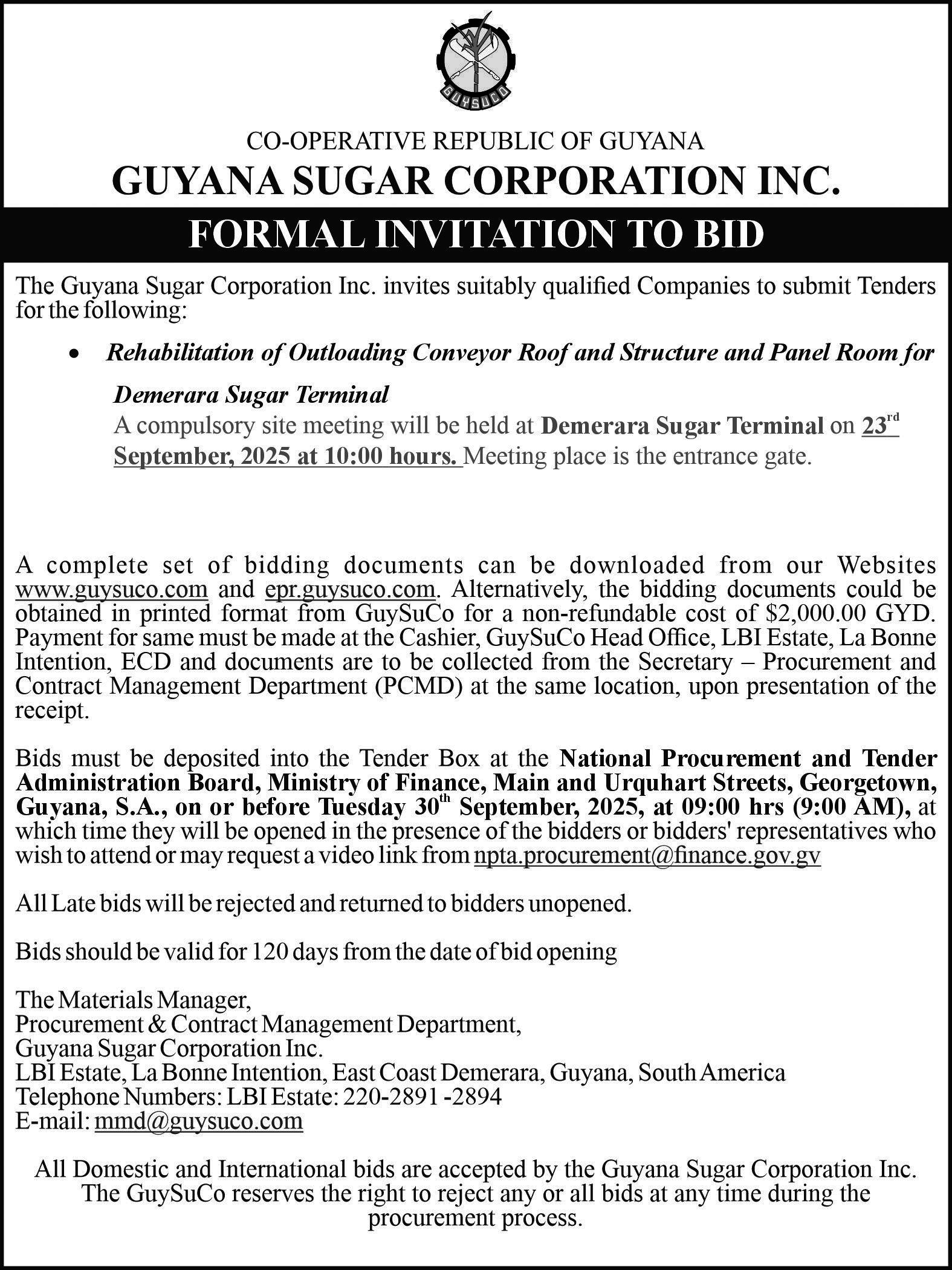
military spending reached an unprecedented $2.7 trillion in 2024 amid intensifying wars and rising geopolitical tensions worldwide.
“The world is spending far more on waging war than in building peace,” the UN Secretary-General António Guterres said at a press briefing for his new report on the threat posed by the steady rise in military expenditure.
Spending on security needs increased across all five global regions during 2024, marking the steepest year-onyear rise for at least the last three decades.
Compared to the $2.7

trillion directed to military budgets, the world could eliminate extreme
poverty for just under $300 billion. “A more secure
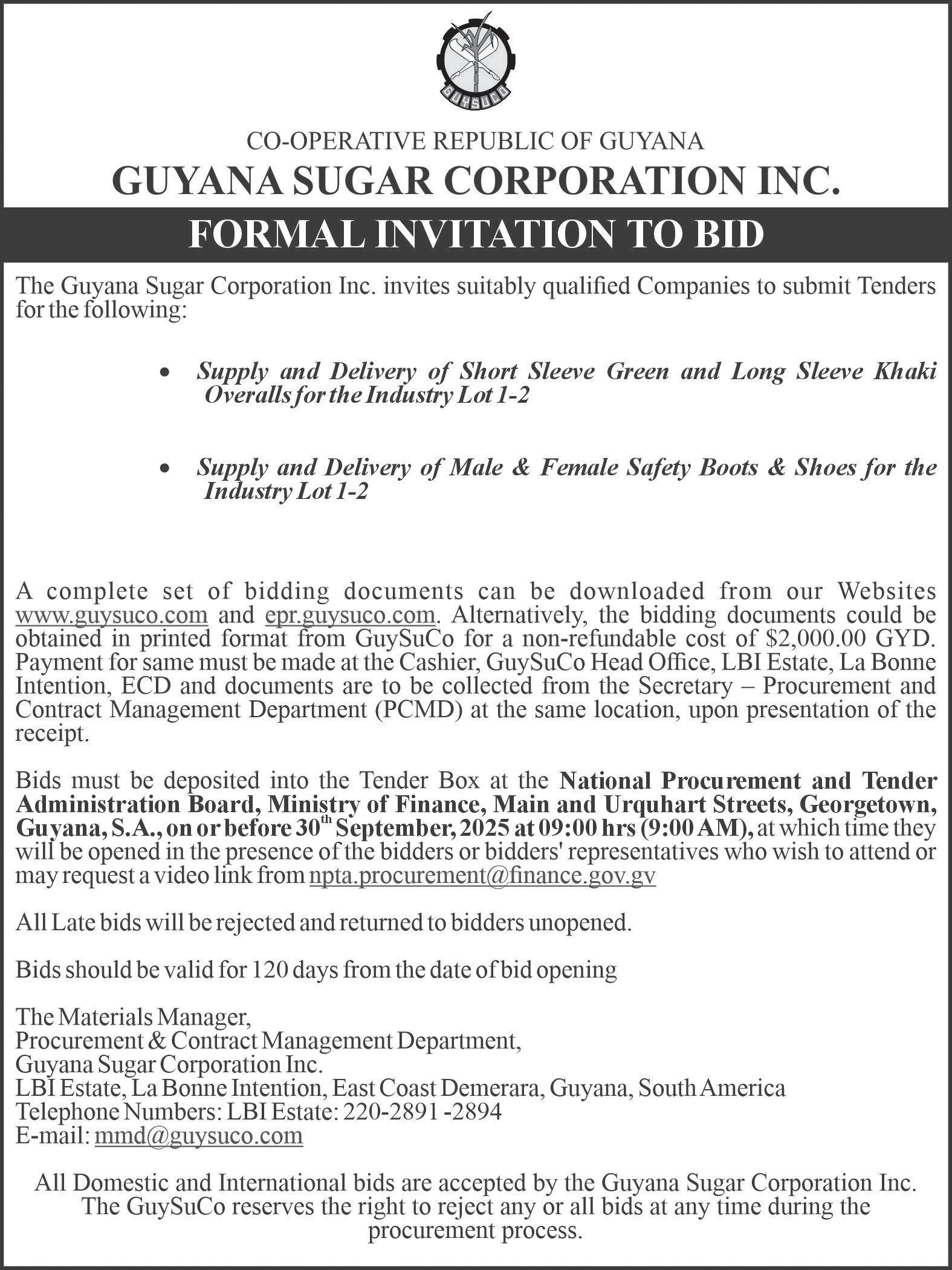
world begins by investing at least as much in fighting poverty as we do in fighting wars,” said Mr. Guterres.
The alarming amount spent on arms-related costs last year alone is 750 times the 2024 UN regular budget. It also equates to almost 13 times the development assistance provided by the OECD’s development assistance committee in 2024, indicating a stark trade-off between military expenditure and sustainable development.
“Redirecting even a fraction of today’s military spending could close vital gaps – putting children in school, strengthening primary health care, expanding clean energy and resilient infrastructure, and protecting the most vulnerable,” said Mr. Guterres.
For a small portion of what was invested in militaries this past year – and the previous decade – the world could fund education for every student in low
document.
“But we know that development is a driver of security and multilateral development cooperation works,” said UN Development Programme (UNDP) deputy chief Haoliang Xu.
“When people’s lives improve, when they have access to education, healthcare, economic opportunities and when they can live lives of dignity and self-determination, we will have more peaceful societies and a more peaceful world.”
and lower middle-income countries, eliminate child malnutrition globally, fund climate change adaptation in the developing world, and bring the international community closer to achieving the Sustainable Development Goals (SDGs), the UN estimates.
“Rebalancing global priorities is not optional – it is an imperative for humanity’s survival,” said the UN disarmament chief Izumi Nakamitsu at the press briefing.
‘SUSTAINABLE DEVELOPMENT IS IN JEOPARDY’
With only one of the five of the SDGs on track, Mr. Guterres stressed that “our shared promise of sustainable development is in jeopardy.”
While more is being spent on militaries, less is being spent for social investment, poverty reduction, education, health, environmental protection and infrastructure – hindering progress on nearly all the SDGs and undermining the UN Charter, the UN’s cornerstone
"Investing in people is investing in the first line of defense against violence in any society,” said Mr. Guterres.
The report calls for a more human-centered and multidimensional approach that priorities diplomacy, international cooperation, and paves the way for sustainable development.
In a vicious cycle, lack of economic opportunity, poverty, and underdevelopment breeds instability – fuelling violence and a rise in State expenditure on the military, the UN report contends.
Investing in development and sustainable security has the potential to stop today’s arms race and alleviate the need for military spending.
“The evidence is clear: excessive military spending does not guarantee peace,” said Mr. Guterres. “It often undermines it – fuelling arms races, deepening mistrust, and diverting resources from the very foundations of stability.” (UN News)
- special event kicks off the action phase of the innovative US$282 million Food System Integrated Programme
THE 2025 Standing Committee on Finance Forum of the United Nations Framework Convention on Climate Change (UNFCCC) kicked off at the headquarters of the Food and Agriculture Organization of the United Nations (FAO) in Rome.
The forum takes place at a critical juncture on the road to the next UN Climate Change Conference in November, known as COP 30, where countries are working towards the collective goal of mobilising US$1.3 trillion in climate finance.
Since its establishment by Parties at COP 17 in 2011, this is the first time the forum has chosen agri-food systems as its central theme: Accelerating climate action and resilience through financing for sustainable food systems and agriculture.
This week of action at FAO also includes special events focused on the potential of sustainable agri-food systems to provide climate solutions.
A high-level ministerial event “Unlocking Sustainable Food Systems for Climate, Nature, and Livelihoods” marked the official opening of the first Global Meeting of the Food Systems Integrated Programme (FSIP).
A flagship initiative of the Global Environment Facility (GEF), co-led by FAO and the International Fund for Agricultural Develop -
ment (IFAD), the FSIP is channelling US$282 million in GEF grants to help transform agrifood systems in 32 countries to be more sustainable, regenerative, nature-positive, resilient, inclusive and pollution-reduced.
The programme's ambitious goals include restoring over 870,000 hectares of degraded land; improving practices across 13.8 million hectares of landscapes; mitigating 174 million tons of greenhouse gas emissions and supporting 3.4 million people in enhancing their lives and livelihoods.
In his address at the event, FAO Director-General QU Dongyu emphasised that “to beat the climate crisis, we need agri-food systems to move faster towards efficiency, inclusivity, resilience and sustainability. And we need climate finance to flow to farmers.”
Qu also highlighted three key principles for addressing climate-related challenges: Agrifood systems provide vital solutions for tackling climate change, biodiversity loss, and land degradation; Adequate financing for agri-food system solutions is critical, particularly for smallholder farmers; and the transformation of agri-food systems must be just, inclusive, and sustainable, harnessing the game-changing potential of women, youth, and Indigenous Peoples.
The high-level event brought together min-
isters, government representatives, and international partners to explore how climate finance can unlock opportunities for sustainable agri-food systems.
The discussions underscored the urgent need to accelerate integrated solutions that contribute to climate action, biodiversity, food security, and resilient livelihoods.
“This week is the first time we have come together with the participating countries, and global partners, to share the ambition of the Food Systems Integrated Programme in terms of achieving impact at scale at national and global levels,” noted the FAO Director-General.
WEEK
In addition to the first global meeting of the Food System Integrated Programme, other special events include the gathering of members of the Food and Agriculture for Sustainable Transformation (FAST) Partnership (10-12 September,) a COP-to-COP mechanism for dialogue on climate, agriculture and finance established at COP 27 in 2022.
A digital exhibit at FAO headquarters spotlights the real-world impact of FAO's support to members in accelerating climate action and building resilience through agri-food systems solutions.
FAO will also cohost a side event with Brazil, this year’s COP presidency, to present the COP30 RAIZ initiative, a cru-
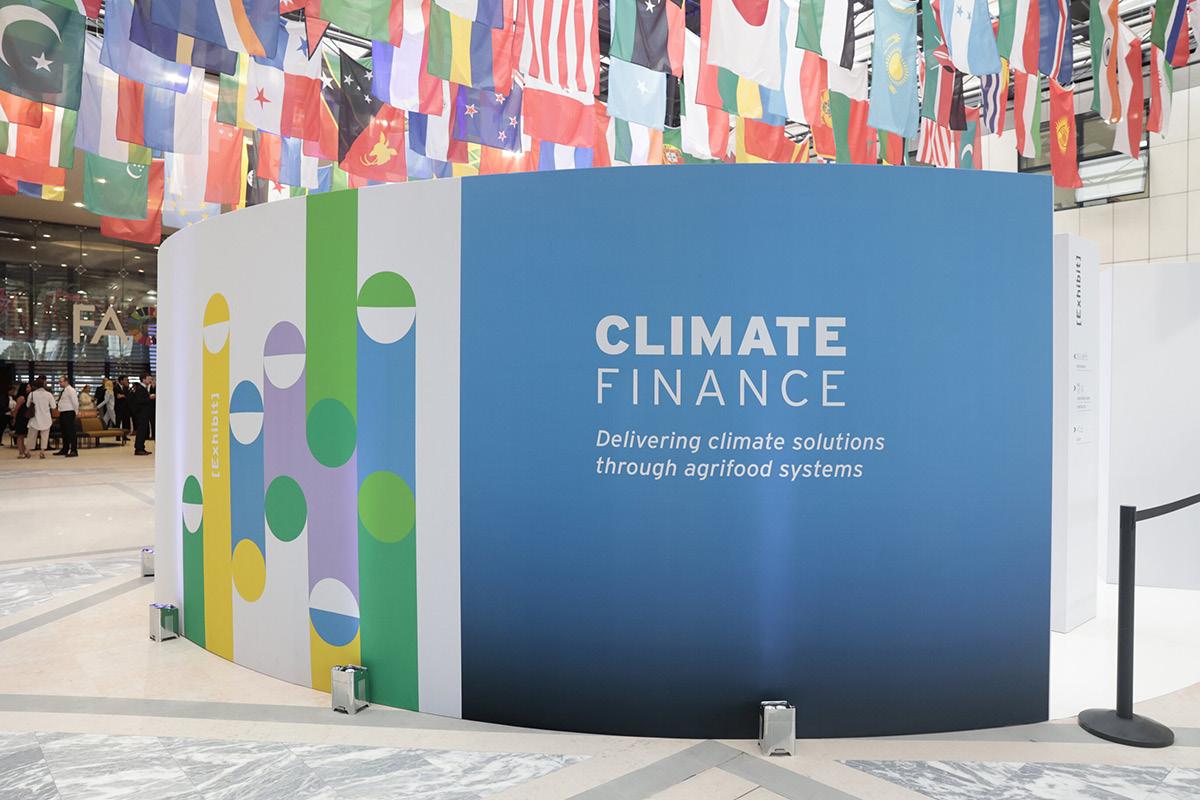
cial step in preparation for COP30 and the broader COP30 Action Agenda. RAIZ
is designed to boost investment in largescale agricultural land restoration to support
food security, fight climate change, protect biodiversity, and stop desertification. (FAO)
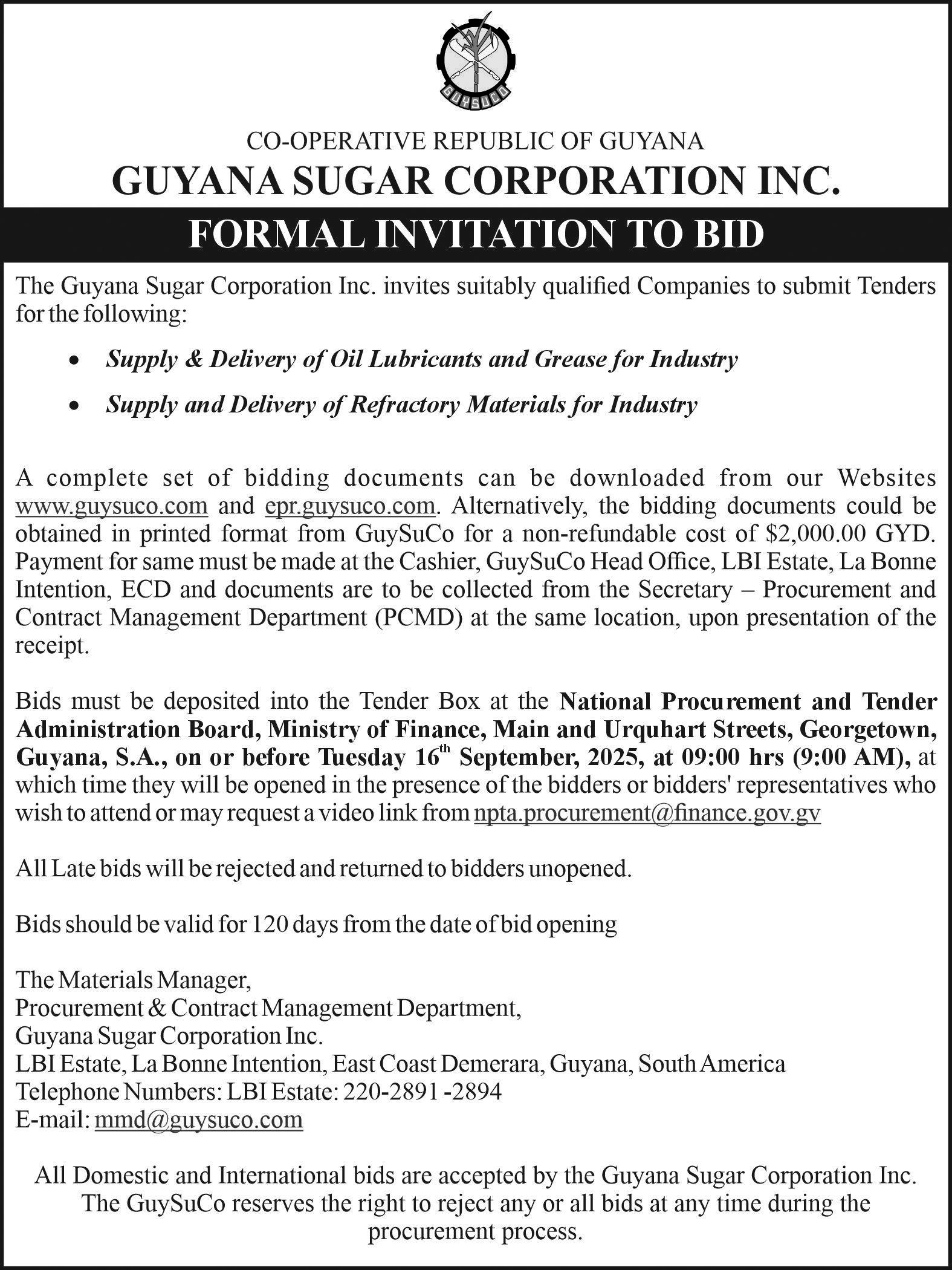
DIRECTOR of Public Information, Edward Layne, has called out the Guyana Press Association (GPA) for what he described as “inaccurate and untruthful claims” regarding President, Dr Irfaan Ali’s treatment of journalist Travis Chase.
In a statement issued on Monday, Layne dismissed the GPA’s call for condemnation of the President’s handling of Chase, calling it “politically
motivated bullying” by the association’s leadership.
He argued that Chase, a self-described journalist, consistently fails to observe basic journalistic ethics and instead engages in confrontational and inflammatory behaviour toward the Head of State, particularly on social media.
“By any measure, Mr Chase’s practices in the media are at once symptomatic and symbolic of a deep, or even pathological, disregard for the
People’s Progressive Party / Civic (PPP/C) administration,” Layne stated.
The DPI Director accused the GPA of defending Chase out of partisan bias, contending that the association itself is “one of the most undemocratic, unbalanced, and congenitally biased organisations in Guyana.” He added that its advocacy for Chase “must not be taken seriously.”
Layne reaffirmed President Ali’s commitment to
protecting freedom of expression in Guyana, but stressed that such freedoms must be exercised within the boundaries of professionalism and the rule of law.
“The expectations of ethical professional conduct must also follow the rule of law,” Layne said, while reaffirming that the government would continue to defend free speech in all its forms and modalities.

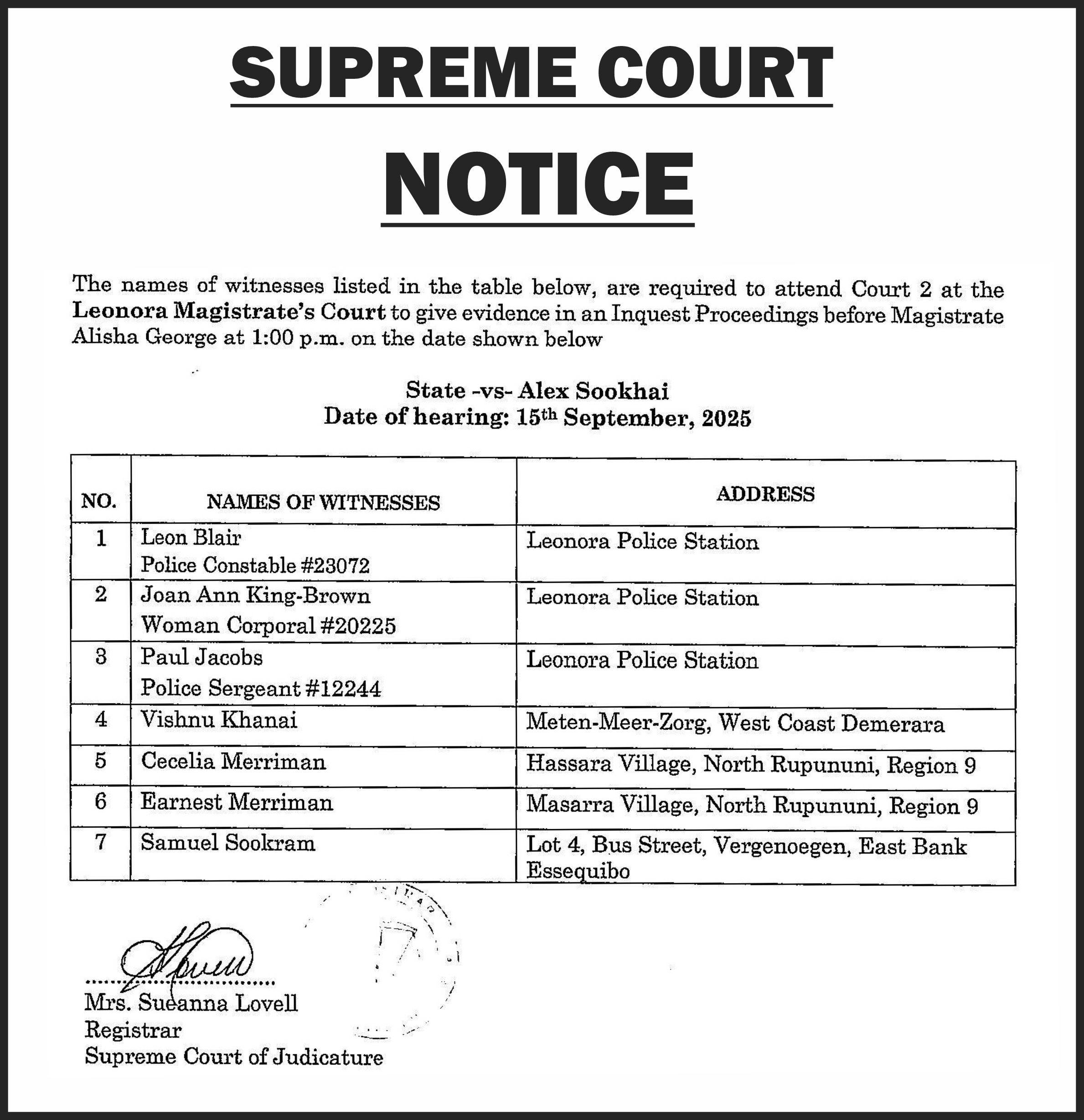
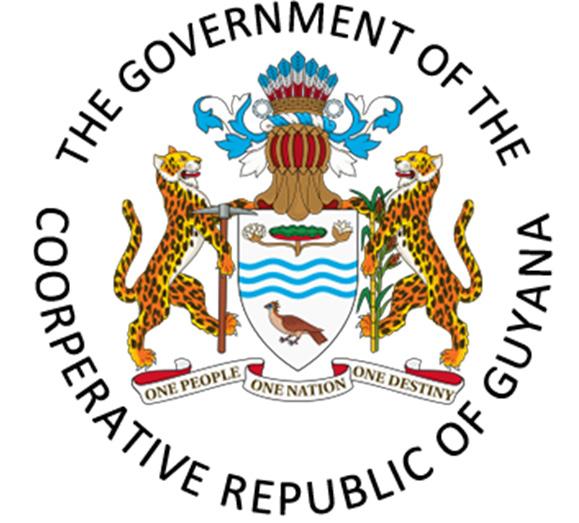
The following is the full text of a statement from the Government of Guyana:
“The Government of Guyana joins the international community in condemning the unilateral bombing by the Israel Defence Force in Doha, Qatar, approximately one mile from the Guyana Embassy.
This violent act is a flagrant violation of international law and a direct assault of the sovereignty and territorial integrity of the State of Qatar.
Guyana strongly believes that the unilateral military strike in Qatar does not help the cause in ending
the war in Gaza nor of achieving lasting peace in the Middle East.
The State of Qatar has been a consistent ally in fighting terrorism and has been instrumental in working closely with the United States and Egypt to bring about a diplomatic solution to the war in Gaza. We therefore stand in full solidarity with the Amir and people of the State of Qatar.
“Guyana urges full respect for international law and support for allies working to end the war in Gaza and combatting global terrorism.”

IN the heart of Region Seven, where traditions run as deep as the rivers that meander through the rainforest, a group of young performers dared to imagine more. They call themselves AYONG, a powerful Arawak word that means “rising like the sun,” and indeed they’ve risen.
Today, this name feels more like a prophecy than just mere symbolism, as it now foreshadows a journey that soon stretched beyond Guyana’s borders.
Earlier this year, the indigenous group gave their first performance during the celebration of the 55th Republic Anniversary on the lawns of Parliament B,uilding. They captivated the crowd with a cultural show that reflected the essence of their deep-rooted heritage.
In just a few months, these same dancers received an opportunity of a lifetime to further showcase the pride of a people often overlooked and on the international stage.
On a transformative journey from the lush Amazon landscapes to the concrete jungle, their dream of international representation became real with an invitation to perform at the 2025 Folk Festival in New York City.
This festival is an annual cultural event that is
produced by the Guyana Cultural Association of New York. It celebrates unity in diversity, while promoting and preserving authentic Guyanese heritage.
The journey began back when Kristie Rambharat, the then-crowned Miss Amerindian Heritage Queen 2023, aimed to preserve a legacy after her reign. The overall vision was to create a cultural group focused on safeguarding and celebrating authentic indigenous traditions through performance.
In 2024, she teamed up with Mikel Andrews, a fellow native from Region Seven known for his extensive contributions to the creative industry. Together, they recruited five other young performers: Jose Roberts, Novita Pawelae, Joshua Bascom, Lily Williams, and Sueann Yipsam.
The dynamic team, most of whom hail from communities such as Karrau Village, Bartica and Batavia, all echoed the same lived connections to Guyanese Indigenous traditions and carry the stories, rhythms and movement in the spirit of the first peoples.
With plans to expand the group further by including a diverse set of talents, Mikel Andrews explained that they have been receiving a large number of requests from people interested in being a part of this rich cultural

movement.
“Our aim is to create a space that allows a wide range of performers who all share the same vision. We would welcome them with open arms, and I commend the participants for their dedication to the craft despite the many challenges.”
In addition to the performance on the international stage, Mikel Andrews was also part of the Guyanese delegation that represented Guyana in the recently concluded CARIFESTA XV celebrations, held in Bridgetown, Barbados, and expressed his gratitude for the unwavering support they have received since their debut performance.
“I would like to say a special thank you to the team’s PR, Calvin Roberts, for giving his energy and showing up and also to the Ministry of Amerindian Affairs, the Ministry of Tourism and the Office of the President.”
In the creative and cultural industry, where indigenous voices are often just side notes, these performances on the regional and international stages felt like a reclamation, as the dancers describe their participation as culturally liberating.
As Guyana celebrates Amerindian Heritage Month this September, AYONG offers a timely reminder that
indigenous culture not only needs to be safeguarded, but also projected authentically onto the world stage.



SBM Offshore Guyana’s 2025 Guyana-Monaco Mousetrap Car Grand Prix
Competition was wrapped up recently with an impressive display of creativity, problem-solving and teamwork from students across the country.
According to a press release, this year’s winners not only took home the top honours but also received science equipment valued at $350,000 each to support their schools’ continued growth in Science, Technology, Engineering and Mathematics (STEM) education.
The top performers were Paramakatoi Secondary’s Doron Fiedtkou and Corwin Barjoan, who excelled in the Innovation and Creativity category; Serena Gangoo and Neheriah Mahadeo of Abram Zuil Secondary, who stood out in Acceleration and Jade Shepherd and Allex Harte of St. Rose’s High, who led the Advanced category.
This year’s competition was held at the Cliff Anderson Sports Hall on February 6, where the students from each of these schools emerged victorious.
As a reward for their outstanding performance, they embarked on two international adventures – first to Suriname to obtain their Schengen visa, then to Europe, where they experienced the sights of Amsterdam, Monaco and Nice.
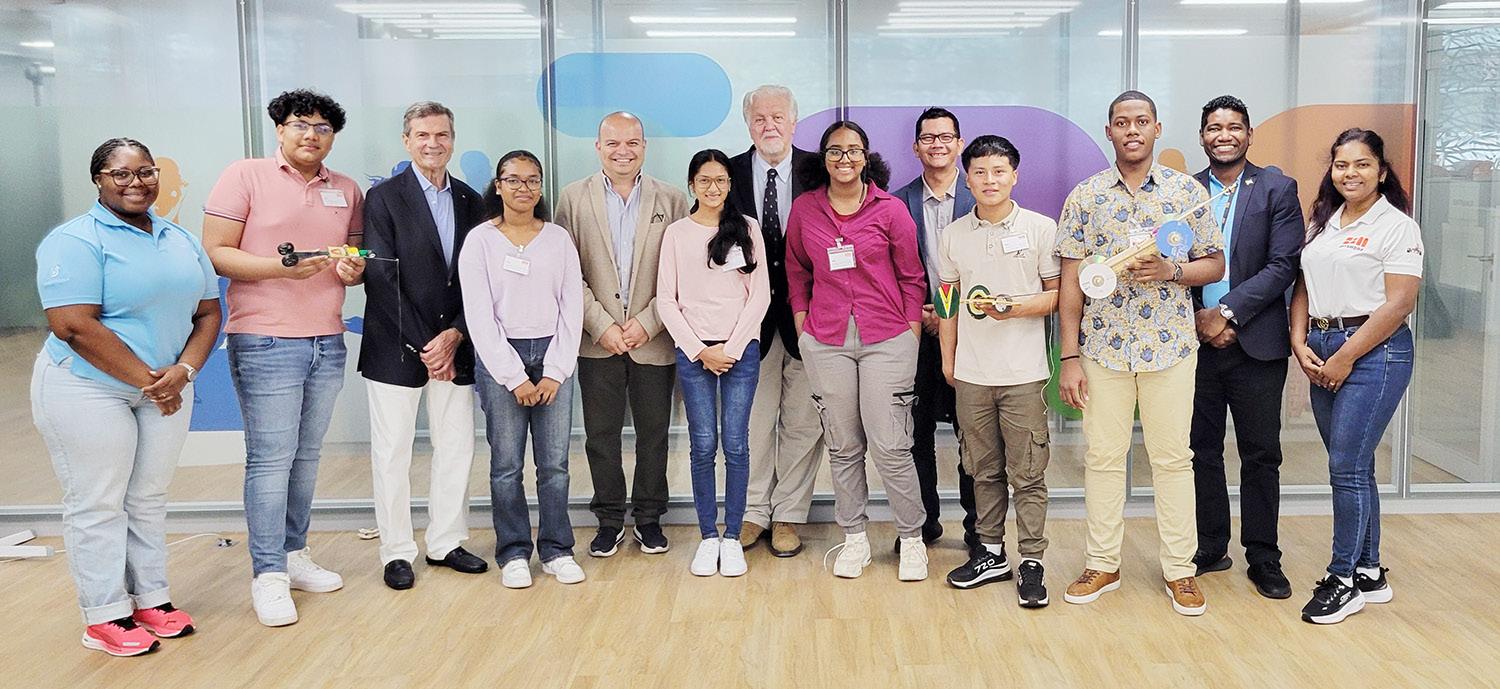
Whilst in Suriname, they engaged in a hands-on STEM workshop that emphasised meta skills and explored how careers in Information and Communications Technology are shaping the future, along with an educational tour of Staatsolie’s oil refinery and power company facility.
They also explored Paramaribo, Suriname’s capital city during a guided tour of the city.
In Amsterdam, the group visited SBM Offshore’s of-
fice, where they met with Chief Executive Officer, Oivind Tangen, and presented their award-winning mousetrap car designs to an audience of SBMers.
The students also benefitted from professional development sessions, including unconscious bias training and participated in an engaging sustainability-focused exercise.
Their time in the Netherlands also included cultural immersion activities such as
a visit to the Rijks museum and a scenic canal tour of Amsterdam.
The journey continued in Monaco, where the students met with Marco Casiraghi, founder of the competition and Francesco Prazzo, General Manager of SBM Offshore’s Monaco office.
“Once again, they proudly demonstrated their innovative mousetrap car creations, reinforcing the competition’s vision to inspire the next generation of problem solv-
ers and innovators,” SBM said.
The trip concluded in Nice, where the students explored the city’s rich cultural heritage and architecture, rounding off a truly global learning experience.
The Guyana–Monaco Mousetrap Car Grand Prix, according to SBM, is more than a competition, it is a transformative platform that challenges students to innovate, collaborate, and envision bold futures in STEM.
SBM Offshore Guyana said it remains committed to supporting initiatives that empower young people to expand their skills, gain international exposure and embrace opportunities that extend beyond the classroom.
The company expressed its appreciation to the Ministry of Education and the Ministry of Culture, Youth and Sport for their invaluable support in making this initiative a success.

POLICE in Regional Division Two are probing the death of a 69-year-old pensioner from Wakenaam Island, whose body was discovered floating in the Supenaam Creek, Essequibo Coast, on Monday morning.
The deceased has been identified as Abdil Ramjan Khan. Reports indicate that at around 07:10 hrs, the subordinate officer in charge of the Aurora Police Station received a call that a body was spotted floating near the Supenaam waterfront, in the vicinity of the Farmers’ Wharf.
Police ranks, including detectives, respond-
ed to the scene where Khan’s body was retrieved from the water. According to investigators, blood was seen oozing from his ear, but no visible marks of violence were found.
The body was later positively identified by Khan’s son-in-law, 34-year-old minibus driver, Navindra Thomas, of Wakenaam Island. It was taken to the Suddie Public Hospital, where Dr. Beharry pronounced him dead on arrival, before being escorted to the hospital mortuary for a post-mortem examination.
Thomas told investigators that on Sunday,
September 7, 2025, at about 11:00 hrs, Khan left Wakenaam alone in his wooden boat, which was powered by a 40-horsepower engine. He was reportedly heading to Supenaam to purchase engine parts but never returned.
Concerned, Thomas went to Supenaam later that evening around 19:40 hrs in search of his father-in-law. On arrival, he observed Khan’s boat moored at the Supenaam waterfront with his clothes lying on the ground near the stelling. He immediately filed a missing person’s report at the Aurora Police Station.

Further investigations led police to canvas the scene for surveillance footage. CCTV footage from a nearby residence captured Khan falling into the water, confirming how he ended up in the creek.
Police have launched a full investigation, and a post-mortem examination is expected to determine the official cause of death.


THIRTY-TWO-YEAROLD Aquiella Abrams has been acquitted of manslaughter in the death of her reputed husband, Michael Wilson, after the
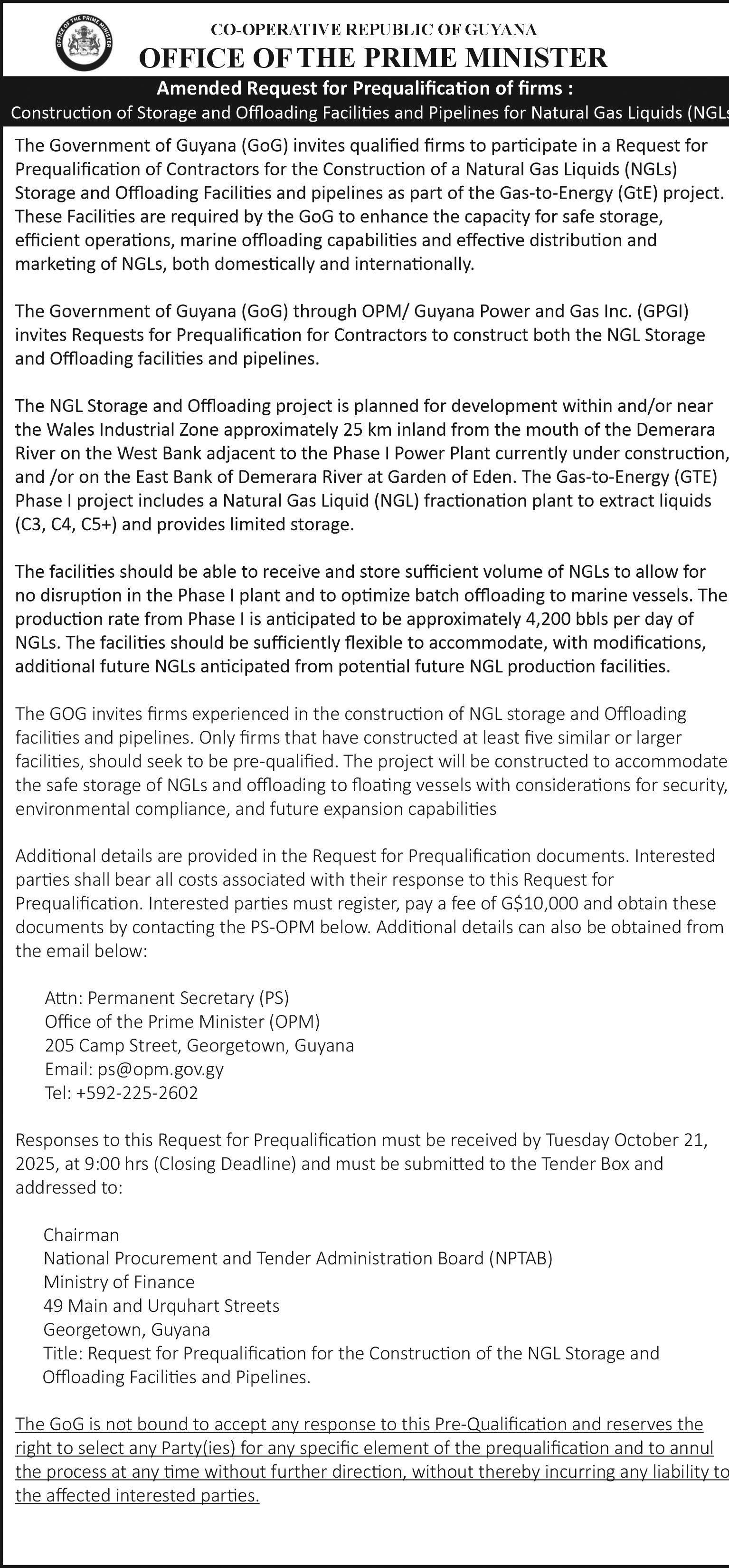
High Court accepted that she acted in self-defence.
The ruling was delivered recently by Justice Priscilla Chandra-Hanif at the Demerara High Court, who upheld a no-case submission from Abrams’ defence team, attorneys-at-law Yuborn Allicock and Shauntelle Wright. The

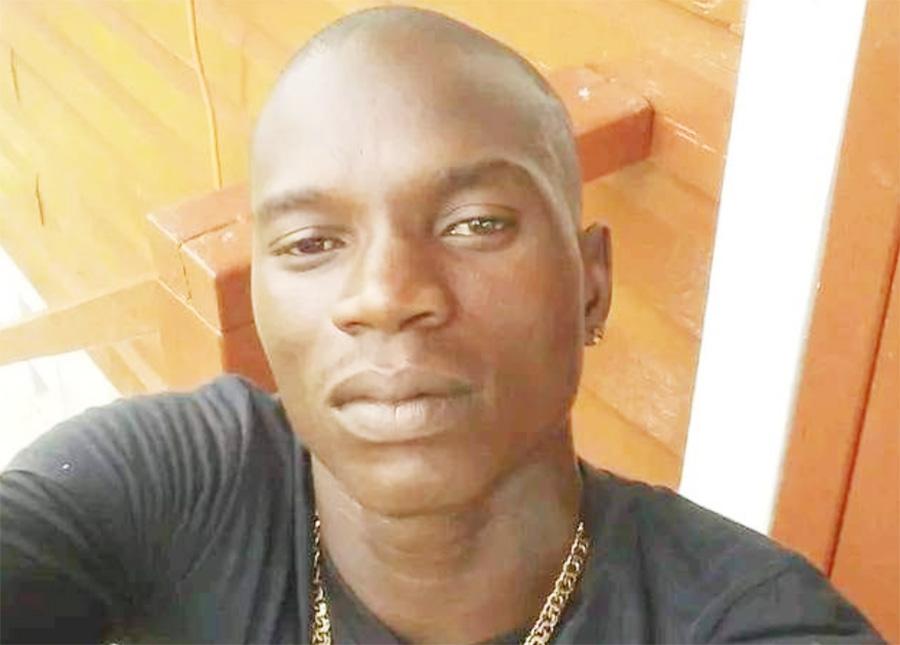
judge instructed the jury to return a formal not-guilty verdict, bringing the nearly three-year legal battle to a close.
Abrams was first charged with the capital offence of murder in October 2022 and remanded following her appearance before Senior Magistrate Fabayo Azore. In March 2023, the charge was reduced to manslaughter, after which she was granted $500,000 bail.
During the trial, the prosecution alleged that Abrams fatally stabbed Wilson, 40, on October 10, 2022, at their Golden Grove, East Coast Demerara, home.
Wilson had sustained two stab wounds to the abdomen and later died while receiving treatment at the Georgetown Public Hospital Corporation.
The court heard that Abrams and Wilson shared a troubled relationship, marked by frequent arguments and reports of infidelity. Police
records also documented instances where quarrels escalated into violence, with Abrams repeatedly identified as the victim of abuse.
On the day of the fatal incident, Abrams reportedly told Wilson she intended to leave the relationship and began preparing to move out of their home.
According to investigators, an argument broke out during which Wilson armed himself with a knife and injured Abrams on her forearm. In the ensuing struggle, Abrams wrestled the weapon away and stabbed Wilson twice in the heat of the confrontation.
Her defence team argued that the State had failed to establish a case against her, noting that the evidence supported her claim of self-defence. Justice Chandra-Hanif agreed, ruling that the prosecution had not proven beyond a reasonable doubt that Abrams acted unlawfully.
With that, the jury was directed to acquit her, formally ending the case.
Coomacka construction worker charged with murder of US-based Guyanese businessman
A 28-year-old construction worker of Coomacka Mines, Upper Demerara River, has been charged with the murder of US-based Guyanese businessman, 49-yearold Courtney Evans.
The accused, Joel Harding, was arrested on September 1, 2025, by police ranks from Mackenzie Police Station. He was formally charged on Monday, September 8, 2025, with the capital offence.
The charge stems from the killing of Evans, which occurred on August 31, 2025, at Coomacka Mines.
Harding appeared at the Linden Magistrate’s Court on Monday before Magistrate Ruschell Liverpool. The murder charge was read to him,
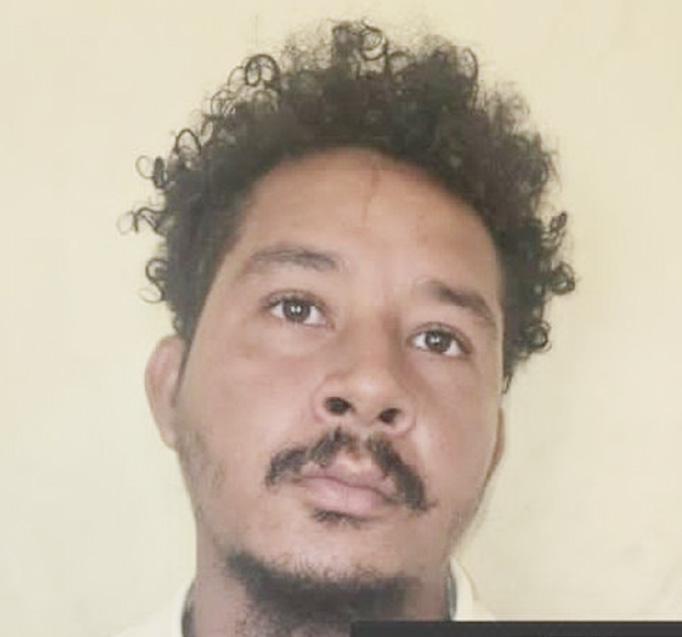
Charged: Joel Harding
and he was not required to enter a plea. He was subsequently remanded to prison.
The case has been adjourned to October 20, 2025, for disclosure.
ACTING Chief Justice, Justice Navindra Singh, has overturned a decision by Magistrate Dylon Bess to dismiss three criminal fraud matters against convicted fraudster Dave Rajeshwar Persaud.
On Monday, September 8, 2025, Justice Singh ruled in favour of the Special Organised Crime Unit (SOCU)—an arm of the Guyana Police Force (GPF)—granting judicial review orders, including declarations and an order of certiorari that overturned Magistrate Bess’s decision.
29, 2025, prosecutors received a WhatsApp message from the clerk advising that Magistrate Bess would be sitting in Leguan and requesting a proposed adjourned date. SOCU suggested June 27, 2025, and the clerk agreed.
H owever, when prosecutors appeared on June 27 and waited for over three hours, they were informed by Magistrate Bess that he had already dismissed the matters on May 29.
He explained that while presiding virtually from Leguan, he
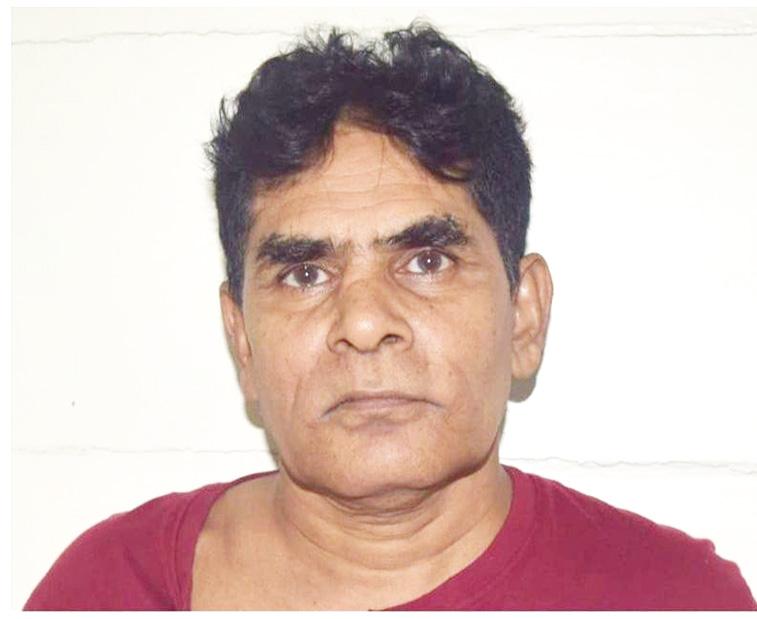
The matters, which were before the Diamond/Golden Grove Magistrates’ Courts, were dismissed by Magistrate Bess while he was presiding at the Leguan Magistrate’s Court.
According to SOCU, the dismissals came despite the fact that the Magistrate’s Court-assigned clerk had communicated to SOCU prosecutors that the matters were adjourned to June 27, 2025, at 9:00 am.
SOCU detailed in its press statement that on the morning of May

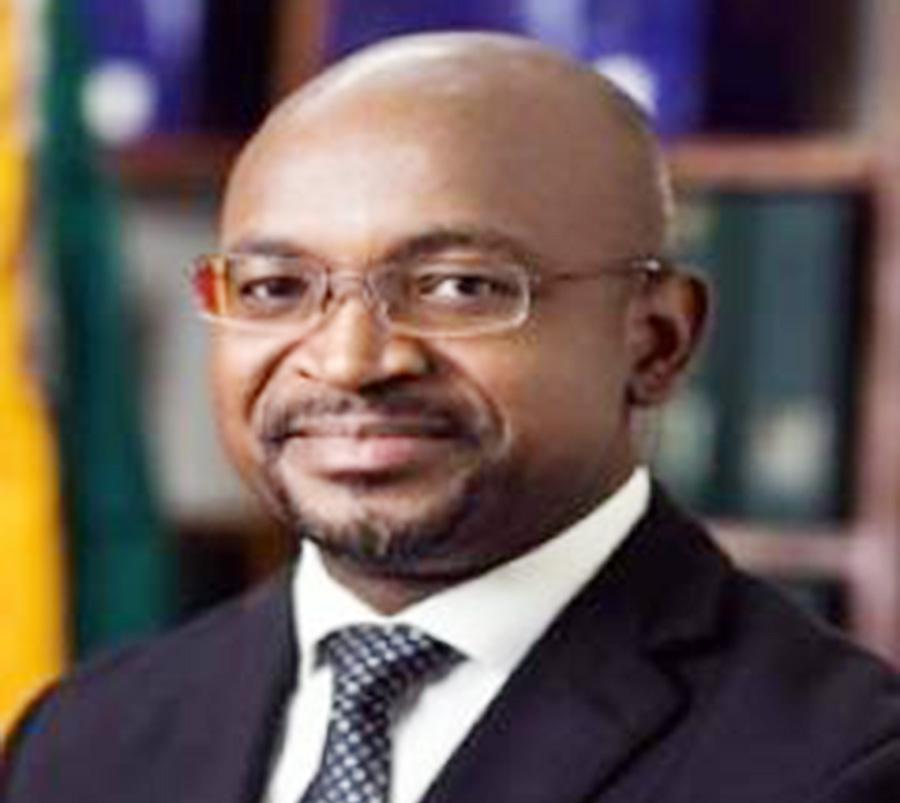
able to the public in the administration of justice, since justice must not only be done but it must appear to have been done, not only on the part of an accused person but on the part of the victim also.”
dealt with the cases via Zoom in the Diamond/ Golden Grove Magistrates’ Courts, with Persaud present online from Lusignan prison. As there was no SOCU representative logged in, he dismissed the charges.
SOCU challenged the dismissals in the High Court, arguing that Magistrate Bess acted “illegally, irrationally, arbitrarily, exercised his discretion wrongly, failed to satisfy or observe conditions or procedures required by law and breached the principles of natural justice.”
Justice Singh, in his ruling, found that the Magistrate’s decision “to determine the matters in a different magisterial district was wholly improper,” and further held that “at minimum, the sitting magistrate ought to have enquired from his court-assigned clerk about the absence of the Prosecution before dismissing the matters.”
Consequently, the court granted SOCU’s application and quashed the dismissal orders. SOCU was represented by Attorney-at-Law and Prosecutor, Mr. David Brathwaite.
Following the ruling, Deputy Commissioner of Police Fazil Karimbaksh, Head of SOCU, issued a statement stressing the wider importance of the judgement. He said: “It is unfortunate that SOCU had to resort to court action to ensure compliance of the Magistrate since Magistrates are creatures of statute and cannot arbitrary and without jurisdiction make pronouncements which are contrary to the law and rules governing the administration of justice.”
Karimbaksh further underscored that accountability in the
justice system applies to all parties: “State agencies are account -
In April, Magistrate Wanda Fortune at the Friendship Magistrate’s Court found Persaud, also known as Dave Persaud, guilty of obtaining $30 million from a widow by false pretence.


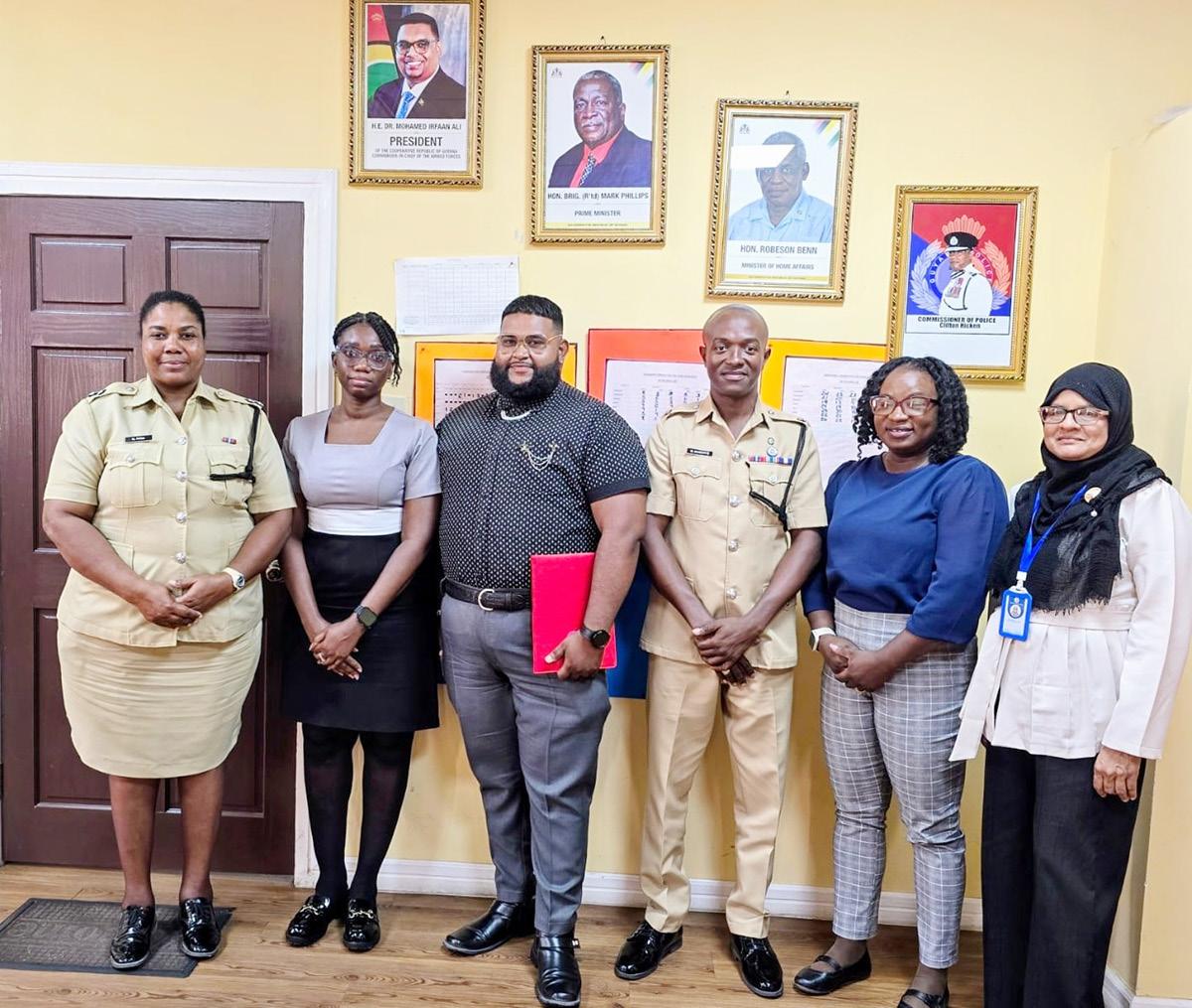
IN response to the rising incidents of school-related violence, Regional Police Division 4B has intensified its collaboration with the Ministry of Education to promote safer learning environments for students.
On September 9, 2025, Commander of Regional Police Division 4B, Superintendent Wayne De Hearte, hosted a high-level meeting with officials from the Ministry of Education’s Schools’ Welfare Department at the Divisional Headquarters.
The Ministry was represented by Senior Schools Welfare Officer, Ms. Rafena Zaman; Regional Welfare Officer for Region Four, Ms. Yolanda James and Senior Guidance Counsellor, Mr. Akash Persaud. Also, present were Woman Inspec -
tor Hall, the Division’s Welfare Officer, and Woman Sergeant Amsterdam, the Community Relations Officer.
The discussions centred on developing a joint strategy to confront violence in high-risk schools, with emphasis on prevention, early intervention, and enhancing support systems for vulnerable students. Both agencies reaffirmed their commitment to a collaborative, multi-stakeholder approach aimed at promoting positive youth development.
Superintendent De Hearte stressed the importance of shared responsibility in protecting students:
“Our children’s safety is a shared responsibility. By strengthening collaboration between the Police Force, educators, and welfare
officers, we can address challenges before they escalate and build safer, more supportive spaces for our young people.”
The meeting concluded with an agreement to launch a pilot programme featuring school outreach initiatives, conflict resolution workshops, and community engagement forums. These initiatives are expected to not only reduce incidents of violence but also strengthen relationships among students, teachers, parents, and the police.
This collaboration forms part of the Guyana Police Force’s broader community partnership policing strategy, which places education and youth empowerment at the forefront of building safer, more resilient communities.








HEAD of the Guyana Amateur Swimming Association (GASA) Yolema Phillips says that the body is hopeful of turning over a new leaf as they seek to regain access to the National Aquatics Centre and be recognised by the Ministry of Culture Youth and Sport.
According to Phillips, “GASA and the ministry have not had a strong working relation for over a year however despite this, we are committed to fostering communication by sending hard and soft copies of corresponds. Unfortunately, we have not received meaningful feedback with the recent formation of a new executive body GASA remains hopeful and open to rebuilding a positive relationship with the Ministry.”
In 2024 the Guyana Amateur Swimming Association was deemed to be ‘not in good standing’ with the National Sports Commission (NSC) and Guyana Olympic Association (GOA) after several issues went unresolved.
PANAM Aquatics, the
regional governing organisation for swimming, had
Aquatics legal board and they provided us with de -

after meeting with the local parties had tasked the local swimming body with implementing measures aimed at improving transparency, fairness and responsiveness to ensure that the local swimming body is properly recognised by both the GOA and NSC.
Philips in an update says they have implemented those recommendations and are awaiting the Ministry to again recognise the body.
“The association is fully compliant with the recommendations from PANAM aquatics. We have held several meetings with PANAM
tailed guidance. We also have detailed a correspondence confirming their satisfaction with the steps we have taken to all outlined requirements,” she said.
She says not having access to the National Aquatics Centre has been detrimental to the younger age groups with only the overseas swimmers having an edge.
“The inability to host competitions at the National Aquatic Centre has had a significant negative impact on our athletes, many of them dedicate countless hours to training with the ultimate goal of competing and have
been denied that opportunity. This has led to deep frustration, demotivation and in some cases, athletes leaving the sport all together. This development has not only affected performance but has hindered the development of competitive swimming in Guyana,”
The PANAM recommendation included establishing and publishing a calendar of domestic events with new rules for registration, competition rules and all information about the event. It was also recommended that GASA create, publish and place a non-discriminatory Selection Criteria Policy, implement a grievance procedure as well as accept as clubs’ affiliates who previously met with GASA. They were also strongly encouraged to meet with clubs and the government to find a balanced and fair distribution of pool use.

(ESPNCRICINFO) - There was a contest between man and nature to see who was hotter and in the end, try as the elements could, they couldn't match Azmatullah Omarzai's fire. Even in 41°C heat, he burned brighter, scoring Afghanistan's fastest T20I fifty and just kept going from there.
Omarzai was responsible for one of two blink-and-you'll-miss-it run-outs, which coming on the back of a Hong Kong fielding performance that included three dropped catches, was cricket working a little too hard to highlight the gulf between the two sides. Full member Afghanistan made 188 for 6. It was 94 too many for their associate nation opposition.
Sediqullah's three lives
Sediqullah Atal looked a real good player. Stood nice and tall in his set-up, seemed competent playing shots off both front foot and the back foot, and crucially, he was able to cope with the lack of pace in Abu Dhabi. He's only 24, but already showing signs of what players more experienced than he are known for.
The bit between the ears. Atal was 26 off 17 with five fours at the end of the powerplay when the other end had contributed only 14 off 19 balls with one six.
Hong Kong slowed Atal down with spin but were never able to capitalise on the pressure they created. Yasim Murtaza gave him two lives - dropping him on 4 off 3 in the
first over, then on 46 off 38 off his own bowling and finally had to watch Ehsan Khan put down a clanger just after Atal had raised his third T20I fifty. A man who should've been dismissed in the first over batted through the innings to score 73 off 52.
Shah, bowling from the other end, got the wickets. The five overs they bowled between the 10th and the 14th yielded two wickets for just 29 runs.
As good as that period was for Hong Kong, it also brought Omarzai to the crease
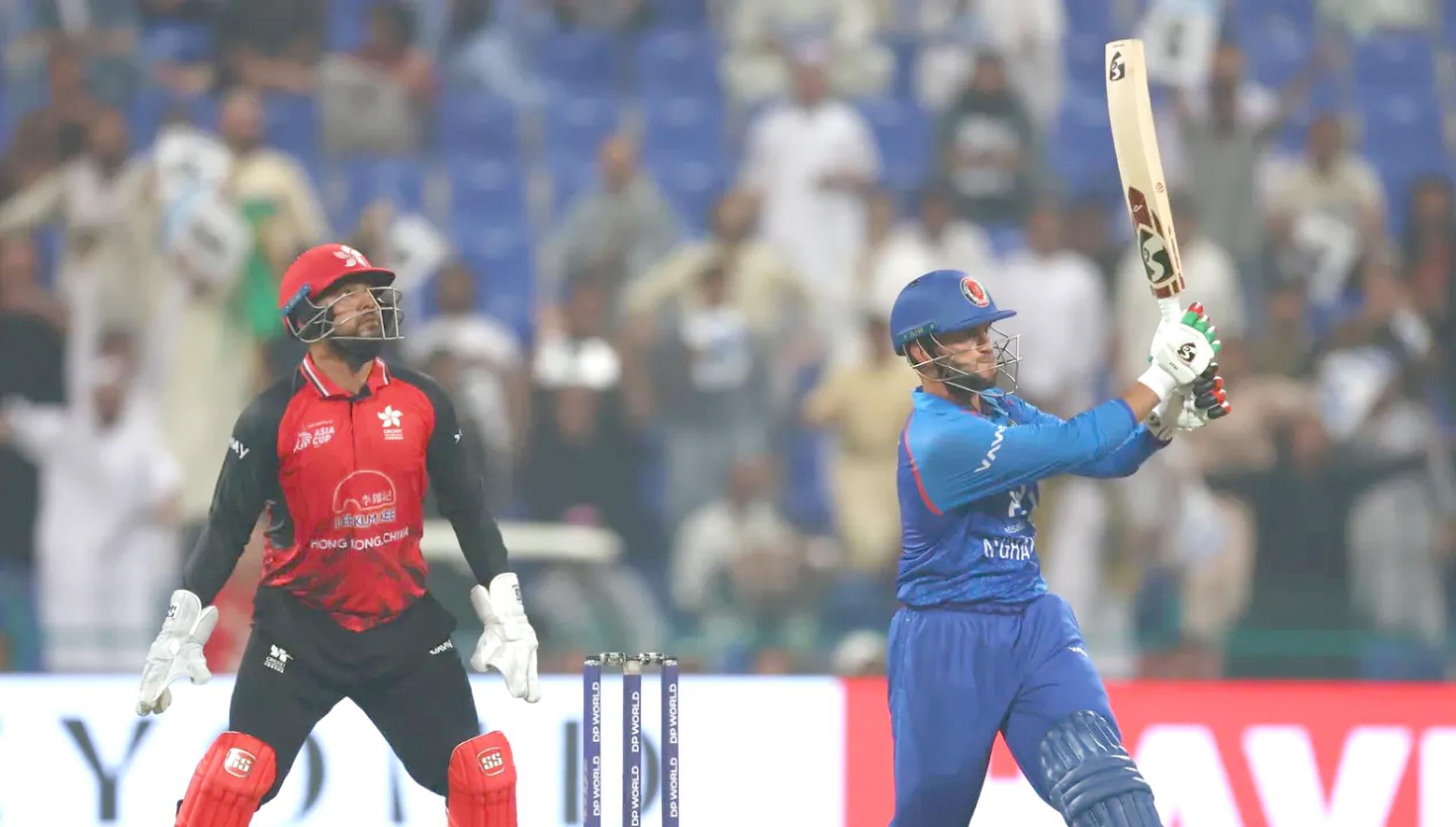
Azmatullah game changer Afghanistan were 119 for 4 after 16 overs. Hong Kong's spinners - Murtaza in particular - provided a challenge that is rarely seen in modern T20 cricket. He pulled pace off the ball, going as low as 70kph at times to deny run-scoring opportunities. Kinchit
and he was so game aware. The fast bowlers returned in the 17th over and it was go time. The next 18 balls yielded 60 runs. Omarzai went 6, 6, 6 and 4 against Ayush Shukla to bring his half-century off just 20 deliveries. From the simple clear the front leg slog to the cheeky ramp past the keeper, the Afghanistan
allrounder showed impressive range on a difficult batting pitch.
Hong Kong punished Hong Kong's mishaps continued with bat in hand as well. They gave up a wicket for no reason - and one run on the board - when Anshy Rath was ruled caught behind but replays showed several inches of daylight between bat and ball.
Zeeshan Ali, the non-striker, had seemingly persuaded Rath from challenging umpire Virender Sharma's decision. Then they had to watch as Rashid Khan run out Nizakat Khan for 0 off 0 balls because he took too long to realise there was no run off a Babar Hayat hit to cover.
Two overs - and two dropped catches later, apparently Afghanistan were happy to give themselves a handicap - Azmatullah had Kalhan Challu run-out off his own bowling when the batter strayed out of his crease after pushing the ball down the pitch. The Hong Kong captain had high hopes for Challu at the toss, instead his wicket for 4 off 8 was a cruel reminder of the quality of cricket at this level.
Hong Kong went joint-second for most wickets (four) lost by a team in the powerplay in the men's T20 Asia Cup. Only two of their batters got to double-digits. None of them managed to score at a run a ball. Their focus at 63 for 6 - had shifted to playing the overs out and they did that to finish on 94 for 9.

(ESPNCRICINFO) - The 2026 men's T20 World Cup is likely to be played between February 7 and March 8. The tournament will be co-hosted by India and Sri Lanka and will comprise 20 teams.
The matches will be played in at least five venues in India and two in Sri Lanka. The final will be in Ahmedabad or Colombo, depending on whether Pakistan is playing. India and Pakistan are not playing in each other's countries due to strained political relations between the two governments at present.
While the ICC is still finalising the schedule, ESPNcricinfo has learned that it has identified the window and informed the participating countries.
At present, 15 teams have been confirmed for the 2026 men's T20 World Cup: India, Sri Lanka, Afghanistan, Australia, Bangladesh, England, South Africa, USA, West Indies, New Zealand, Pakistan, Ireland, Canada, Netherlands and Italy, who have qualified for a World Cup for the first time.
Of the remaining five teams, two will come from the Africa regional qualifier and three from the Asia and East Asia Pacific
qualifier.
The format will be the same as the 2024 men's T20 World Cup in the West Indies and the USA, where the 20 teams were divided into four groups of five each, with the top two from each group qualifying for the Super Eight round, where once again the eight teams were divided into two groups of four.
The top two from each Super Eight group progressed to the semi-finals. India are the reigning champions, having beaten South Africa in the final in Barbados. The entire tournament comprised 55 matches.
India are hosting several marquee events in the first four months of 2026 starting with the WPL, dates for which are yet to be finalised.
The BCCI has earmarked a window between early January and early February for the five-team tournament. The WPL will be followed by the men's T20 World Cup, after which the BCCI will host the IPL, with the tentative window being March 15 to May 31. India also host New Zealand for ODIs and T20Is from January 11 to 31.
- to head men and women 7’s programmes
THE Guyana Rugby Football Union has announced Steven Lewis as the successor of Claudius Butts as head coach of both male and female 7’s teams.
Lewis was named USA Rugby Coach of the Year in 2016 and 2019 and led several USA Rugby Collegiate All-Americans teams.
He served as General Manager of 2022 Major League Rugby (MLR) champions Rugby New York and has coached Nigeria 7s and Jamaica 7s teams.
The coach’s first assignment will be the country next regional 7’s campaign set for November 22-24 in Trinidad and Tobago.
Head of the GRFU Ryan Dey say this is the man for the job with his vast experience, adding, “He has coached many teams at a high level and he actually is the person that was coaching Jamaica just the other day and carried Jamaica to two finals and made them one of the most successful teams now.”
Dey is hopeful this coach will put Guyana on course to be rediscovering their form as regional powerhouses as they have a
talented bunch of players.
“The Union thinks it is necessary to have somebody who has been to the top level because there is where we see ourselves for the next Olympics, we need to have somebody that has been there, somebody with that experience.
Steve is a Level Three coach and he has coached all over the world and we are proud and happy to have him here for the couple of weeks leading into RAN 7’s.”
Lewis has hit the ground running since arriving in Guyana last week, working with the men’s team and as well as the women’s team which will make their re-entry to the regional competition after many years.
The regional 7’s, the GRFU head said is a qualifier for the 2028 Olympics, so they need the knowledge of a world-renowned coach who will work along with the local coaches.
The Guyana’s rugby team, once the envy of the region, has been in the doldrums struggling to add to their 7’s or 15’s titles of yesteryear.

THE Georgetown Cricket Umpires and Scorers Association (GCUSA), in collaboration with the Caribbean Premier League (CPL) and CPL Match Officials, is continuing a unique programme to expose local umpires to television umpiring. This initiative, which began in 2024, aims to enhance the skills and knowledge of umpires in Guyana.
The programme provides local officials with invaluable exposure to the intricacies of third-umpire decision-making. Through interactive sessions led by experienced CPL match officials, participants are learning how to use television technology to make accurate decisions in modern-day cricket.
The sessions focus on the decision-making process's roles, communication, and flow.
Dharam Singh, a local
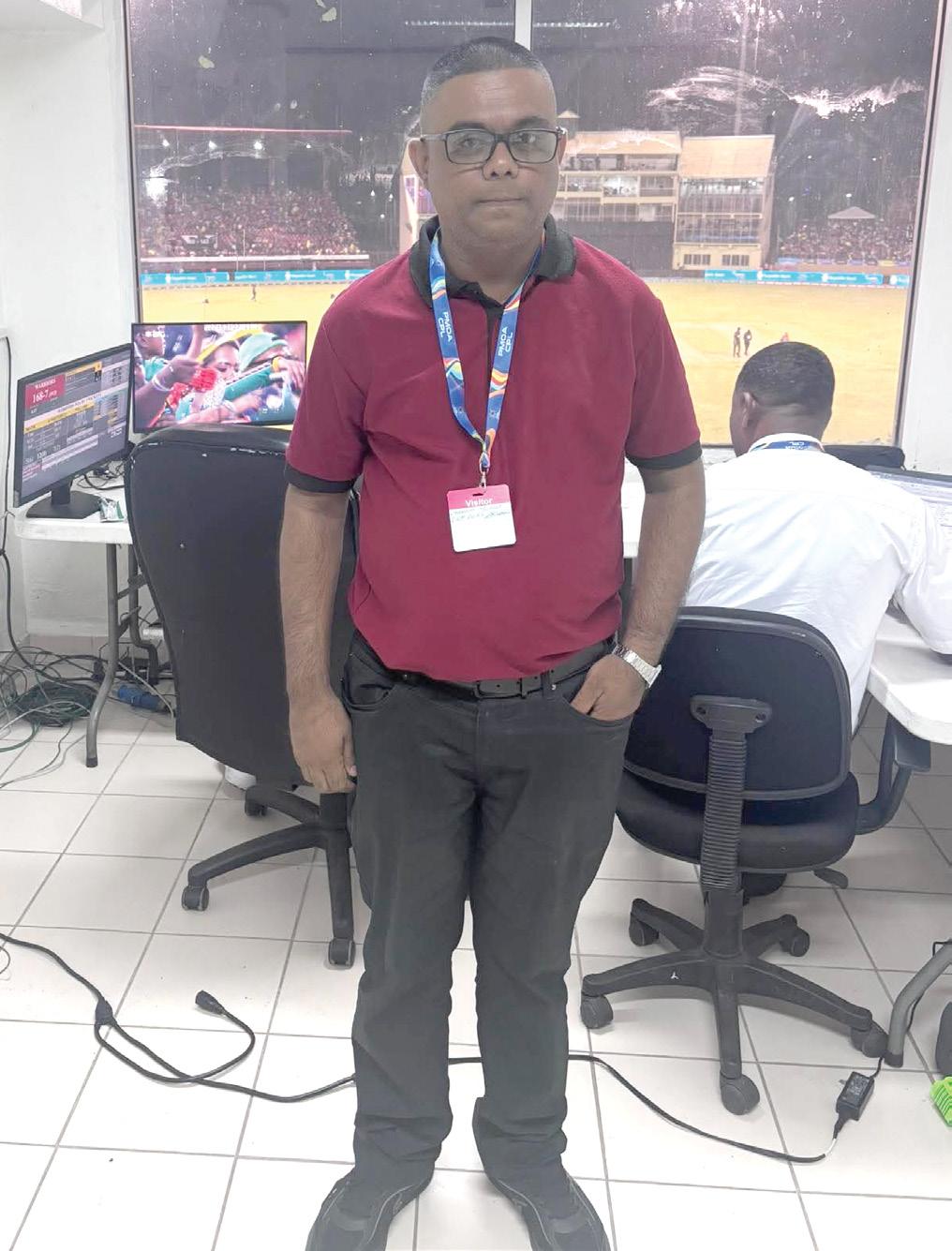
Dharam Singh, a local umpire who participated in the first night of this year’s collaboration
(CMC) - Jonathan van Lange and Aadian Racha shared an unbroken partnership of 28 for the ninth wicket as the West Indies Under-19s held on to earn an important two-wicket win over Sri Lanka Under-19s in the fifth Youth One Day International here on Tuesday.
Chasing the visitors’ total of 172 in 48 overs at the Sir Vivian Richards Stadium, West Indies slid to 145 for eight before van Lange, who scored an unbeaten 24 and Racha, who made 17 not out, steadied the ship and carried them to 173 for eight in 47.4 overs.
It gave the West Indies a crucial 3-2 lead over Sri Lanka in their best-of-seven series and needing just one more win to clinch the series.
The home side seemed to be coasting to victory when opener Micah Greenidge and Earshino Fontaine were at the crease during a 101-run partnership that propeled them to 104 for one in the 25th over.
But once Vigneshwaran Akash struck to break the partnership by bowling Fontaine for 48 and having Greenidge caught and bowled for 40, in the space of three overs, the West Indies lost seven wickets for 41 runs, with Akash responsible for four of the wickets to fall.
However, with Sri Lanka in the ascendancy, van Lange and Racha came together to take the Windies to their second successive win.
Earlier, medium pacers Racha and Shaquan Belle claimed three wickets apiece to help restrict Sri Lanka to a below par total.
Opener Dimantha Mahavithana top scored with 38 and Chamika Heenatigala hit 36, but Sri Lanka also needed a herculean effort from their lower order to get up to their total after slipping to 136 for eight.
Racha finished with figures of 3-37, Belle took 3-43 and Jakeem Pollard 2-12.
The sixth Youth ODI will take place on Friday.
umpire who participated in the first night of this year's collaboration, offered positive feedback.
"My understanding of the role of the third umpire has grown tremendously," Singh said. "I observed firsthand how important focus, communication, accuracy and timing management was.
Being able to communicate with the third umpire and match referee was an invaluable experience. This experience was surreal and unlike no other."
The programme is set to continue throughout the remaining CPL league matches in the Guyana leg, with umpires from different counties participating in every match until the end of the tournament.
THE Guyana Football Federation (GFF) has officially welcomed its new Senior Men’s National Team head coach, Thomas Dooley, as the former United States international arrived in the country to assume his role. Dooley, 64, is set to embark on a packed schedule of meetings and his first training sessions with domestic players.
His initial visit is focused on laying the groundwork for the 'Golden Jaguars' and building a solid foundation for their upcoming international campaigns.
This appointment marks a new era for the national team, as part of the GFF's strategic push to elevate the programme in both performance and professionalism.
Dooley brings an impressive resume to the role.
As a player, he earned 81 caps for the United States, including captaining the team
at the 1998 FIFA World Cup. On the coaching side, he holds a UEFA Pro Licence— the highest certification in football coaching globally. He famously led the Philippines to an unbeaten qualification campaign for the 2019 AFC Asian Cup. GFF President Wayne Forde expressed his confidence in the new head coach, stating that Dooley "brings a full set of tools and expertise" for the federation’s new direction.
Upon his arrival, Dooley said he was "honoured and excited" to take on the role.
"I have been deeply impressed by the talent and potential of this group of players, and I firmly believe they can achieve even greater heights," he added.
Dooley's immediate focus will be on assessing the current player pool, building out his technical team, and preparing for future international tournaments.

to head men and women 7’s programmes


